American Finance Association – Office of President
The following statements of formal duties are provided in the Bylaws for The American Finance Association
Section 2. President. The President shall be the principal executive officer and shall perform all duties incident to the office of president and such other duties as may be provided by the Board of Directors. The President shall be elected for a one-year term by the members. The nominee of the Nominating Committee shall be the current President-Elect. Space shall be provided on the ballot for write-in votes, which shall be counted. The results of the election shall be certified and announced by the Executive Secretary and Treasurer at the annual meeting.
Section 3. President-Elect. The President-Elect shall serve for a one-year term and in the following year shall be the only nominee of the Nominating Committee for President. He or she shall have included in his or her duties the function of the Chair of the Program Committee with the responsibility of appointing the committee members and such other tasks as may be assigned by the President. The sole nominee of the Nominating Committee for this office shall be the current Vice President. Space shall be provided on the ballot for write-in votes, which shall be counted. The nominee and space for write-in votes shall appear on the same ballot as the election of the President, provided in Article V, Section 2. The results of the election shall be certified and announced by the Executive Secretary and Treasurer at the annual meeting.
Most of this list was compiled by the AFA Historian, Stephen Buser.
| Name | Year Served |
|---|---|
| Monika Piazzesi, Stanford University | 2024 |
| Markus Brunnermeier, Princeton University | 2023 |
| Laura Starks, University of Texas at Austin | 2022 |
| John Graham, Duke University | 2021 |
| Kenneth Singleton, Stanford University | 2020 |
| David Hirshleifer, University of California, Irvine | 2019 |
| Peter DeMarzo, Stanford University | 2018 |
| David Scharfstein, Harvard University | 2017 |
| Campbell Harvey, Duke University | 2016 |
| Patrick Bolton, Columbia University | 2015 |
| Luigi Zingales, University of Chicago | 2014 |
| Robert Stambaugh, University of Pennsylvania | 2013 |
| Sheridan Titman, University of Texas at Austin | 2012 |
| Raghuram Rajan, University of Chicago | 2011 |
| John H. Cochrane, University of Chicago | 2010 |
| Darrell Duffie, Stanford University | 2009 |
| Jeremy C. Stein, Harvard University | 2008 |
| Kenneth R. French, Dartmouth College | 2007 |
| Richard C. Green, Carnegie Mellon University | 2006 |
| John Y. Campbell, Harvard University | 2005 |
| René Stulz, Ohio State University | 2004 |
| Douglas W. Diamond, University of Chicago | 2003 |
| Maureen O’Hara, Cornell University | 2002 |
| George M. Constantinides, University of Chicago | 2001 |
| Franklin Allen, University of Pennsylvania | 2000 |
| Hans R. Stoll, Vanderbilt University | 1999 |
| Edwin J. Elton, New York University | 1998 |
| Hayne E. Leland, University of California, Berkeley | 1997 |
| Eduardo S. Schwartz, University of California, Los Angeles | 1996 |
| Martin J. Gruber, New York University | 1995 |
| Sanford J. Grossman, University of Pennsylvania | 1994 |
| Mark E. Rubinstein, University of California, Berkeley | 1993 |
| Michael C. Jensen, Harvard University | 1992 |
| Robert H. Litzenberger, University of Pennsylvania | 1991 |
| Myron S. Scholes, Stanford University | 1990 |
| Michael J. Brennan, University of California, Los Angeles | 1989 |
| Stephen A. Ross, Yale University | 1988 |
| Richard Roll, University of California, Los Angeles | 1987 |
| Robert Merton, Massachusetts Institute of Technology | 1986 |
| Fischer Black, Goldman Sachs & Company | 1985 |
| James C. Van Horne, Stanford University | 1984 |
| Stewart Myers, Massachusetts Institute of Technology | 1983 |
| Harry Markowitz, IBM Corporation | 1982 |
| Franco Modigliani, Massachusetts Institute of Technology | 1981 |
| William F. Sharpe, Stanford University | 1980 |
| Edward Kane, Ohio State University | 1979 |
| Burton Malkiel, Princeton University | 1978 |
| Alexander A. Robichek, Stanford University | 1977 |
| Merton H. Miller, University of Chicago | 1976 |
| Myron J. Gordon, University of Toronto | 1975 |
| John Lintner, Harvard University | 1974 |
| Sherman Maisel, University of California, Berkeley | 1973 |
| Irwin Friend, University of Pennsylvania | 1972 |
| Joseph Pechman, Brookings Institute | 1971 |
| Lawrence S. Ritter, New York University | 1970 |
| Walter E. Hoadley, Bank of America | 1969 |
| Harry C. Sauvain, Indiana University | 1968 |
| Robert V. Roosa, Brown Brothers Harriman & Company | 1967 |
| J. Fred Weston, University of California, Los Angeles | 1966 |
| George Garvy, Federal Reserve Bank of New York | 1965 |
| Roger F. Murray, Columbia University | 1964 |
| George T. Conklin, Jr., Guardian Life Ins. Co. of America | 1963 |
| Bion B. Howard, Northwestern University | 1962 |
| Arthur M. Weimer, Indiana University | 1961 |
| Paul M. Van Arsdell, University of Illinois | 1960 |
| James J. O’Leary, Life Insurance Association of America | 1959 |
| Lester V. Chandler, Princeton University | 1958 |
| Marshall D. Ketchum, University of Chicago | 1957 |
| Miller Upton, Beloit College | 1956 |
| Norris O. Johnson, First National City Bank of New York | 1955 |
| Garfield V. Cox, University of Chicago | 1954 |
| Roland I. Robinson, Northwestern University | 1953 |
| Edward E. Edwards, Indiana University | 1952 |
| Raymond J. Saulnier, National Bureau of Economic Research | 1951 |
| Howard R. Bowen, University of Illinois | 1950 |
| Neil H. Jacoby, University of California, Los Angeles | 1949 |
| Benjamin H. Beckhart, Columbia University | 1948 |
| Lewis A. Froman, Russell Sage College | 1947 |
| Harry G. Guthmann, Northwestern University | 1946 |
| Inactive | 1945 |
| Inactive | 1944 |
| John D. Clark, University of Nebraska | 1943 |
| Charles L. Prather, University of Texas | 1942 |
| Chelcie C. Bosland, Brown University | 1941 |
| Kenneth Field, Carnegie Institute of Technology | 1940 |
Past Presidents of the American Finance Association from 1940-Present
Monika Piazzesi (2025)
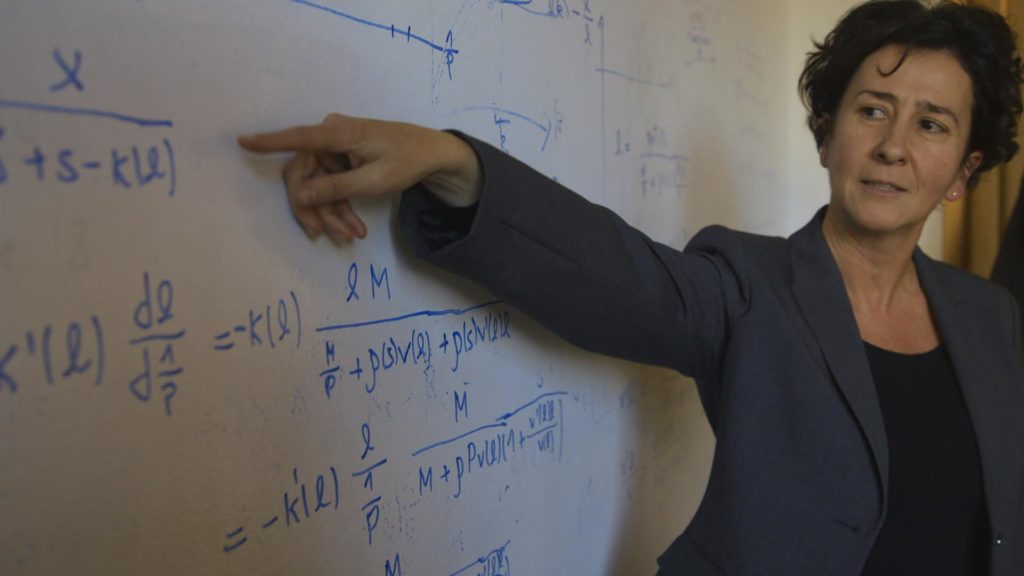
Monika Piazzesi is the Joan Kenney Professor of Economics at Stanford University and a senior fellow at the Stanford Institute for Economic Policy Research. She earned her Ph.D. in economics from Stanford in 2000 and has held faculty positions at UCLA, the University of Chicago Booth School of Business, and Stanford, which she joined in 2008.
Her research focuses on asset pricing, macroeconomics, and time series econometrics, with particular emphasis on bond markets, housing, bank risk, and monetary policy. She has published influential work on the term structure of interest rates and continues to explore topics such as Taylor rules and the yield curve.
Piazzesi has received numerous honors, including the Germán Bernácer Prize (2005), the Elaine Bennett Research Prize (2006), and election to the National Academy of Sciences (2023). She directed the NBER Asset Pricing Program from 2007 to 2019 and has also held editorial roles with leading journals including the Journal of Political Economy, American Economic Review, and Economic Journal.
Markus Brunnermeier (2023)

Markus K. Brunnermeier is the Edwards S. Sanford Professor at Princeton University and Director of the Bendheim Center for Finance. Markus is known for his expertise in international financial markets, monetary theory, and macroeconomics.
His academic achievements include a PhD from the London School of Economics and a Doctor honoris causa from the University of Regensburg. Brunnermeier has authored award-winning books such as “A Crash Course on Crises”, “The Resilient Society”, and “The Euro and the Battle of Ideas”.
Brunnermeier is a member of several advisory groups, and he is a nonresident senior fellow at the Peterson Institute, a Sloan Research Fellow, fellow of the Econometric Society, Guggenheim Fellow, a research associate at the National Bureau of Economic Research, the Centre for Economic Policy Research, CESifo, ABFER, and a member of the Bellagio Group on the International Economy. He is also the recipient of the Bernácer Prize granted for outstanding contributions in the fields of macroeconomics and finance.
Laura Starks (2022)

Laura T. Starks, Ph.D., is the George Kozmetsky Centennial University Distinguished Chair at the McCombs School of Business, University of Texas at Austin, where she teaches graduate and undergraduate courses on environmental, social and governance investing. Her current research focuses on ESG issues, including climate finance and board diversity, as well as molecular genetics and financial decisions. She has won many awards for her research and teaching. She is Research Associate of the NBER, Research Member for the ECGI, and Senior Fellow for ABFER. She has served as President of the Society of Financial Studies, Western Finance Association and Financial Management Association, and is a Past President of the American Finance Association. She is Editor of the FMA Survey and Synthesis Series, Advisory Editor for the Financial Analysts Journal and Financial Management and previously, Editor of the Review of Financial Studies. She has served or currently serves on mutual funds’ boards of directors, pension fund advisory committees, the Board of Governors of the Investment Company Institute, and the Governing Council of the Independent Directors Council, and advisory committees for the Norwegian Government Pension Fund.
John Graham (2021)

Dr. Graham is the D. Richard Mead professor of finance at the Fuqua School of Business at Duke University. His past work experience includes teaching at the University of Utah and seven years working as a senior economist at Virgina Power. He has been co-editor of the Journal of Finance, associate editor of The Journal of Finance, The Review of Financial Studies, Finance Research Letters, and Financial Management, and has served on the board of directors of the American Finance Association, the Western Finance Association, and the Financial Management Association, three of the largest academic finance professional organizations. Graham is currently President-elect of the Financial Management Association and has been President of the Western Finance Association, is a Fellow of the Financial Management Association, and is a research associate of the National Bureau of Economic Research. He is multiple time winner of best teacher awards and also a recipient of the overall Outstanding Faculty award. Graham has served as area coordinator of Duke’s finance group and as co-director of the Duke Center for Financial Excellence.
Graham has published more than 50 articles and book chapters on corporate taxes, cost of capital, capital structure, financial reporting, and payout policy. His research has won numerous best paper awards. His teaching focuses on corporate finance, taxes, mergers and acquisitions, and corporate restructuring. His simulated corporate marginal tax rates are widely used and are an important input in the Duff and Phelps cost of capital publications.
Since 1997 Graham has been the director of the Global Business Outlook (http://www.cfosurvey.org), a quarterly CFO survey that assesses the business climate and topical economic issues around the world. He appears regularly in the media to discuss the survey and corporate sector. Finally, Graham is lead author on the textbooks Corporate Finance: Linking Theory to What Companies Do (Cengage) and Introduction to Corporate Finance (Cengage).
Kenneth Singleton (2020)

Kenneth Singleton is the Adams Distinguished Professor of Management, Emeritus at the Graduate School of Business at Stanford University. Professor Singleton’s research interests are in econometric methods for estimation and testing of dynamic asset pricing models; modeling of term structures of government and defaultable bond yields; measuring and managing market, credit and liquidity risks; and debt financing in emerging economies. He has been awarded the Smith-Breeden Prize (Journal of Finance), Frisch Medal (Econometrica), and the Stephen A. Ross Prize in Financial Economics (Foundation for the Advancement of Research in Financial Economics), and he is a Fellow of the Econometric Society, the Journal of Econometrics, and the Society for Financial Econometrics.
Ken is the Co-Founder and President of the Board of the 501(c)3 nonprofit 1 Grain to 1000 Grains that leads programs for families in low-income communities to create positive lifestyle changes by discovering intuitive and actionable plans for more healthful eating and for building financial capacity. Ken received a BA in Mathematics from Reed College and a PhD in Economics from the University of Wisconsin-Madison.
David Hirshleifer (2019)
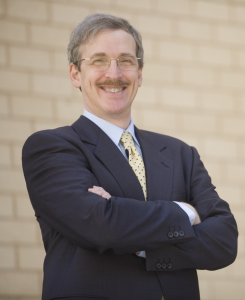
David Hirshleifer is a Professor of Finance at The Paul Merage School of Business since 2006 and currently holds the Merage chair in Business Growth at the University of California at Irvine. Hirshleifer served as President of the American Finance Association in 2019. He was also assigned as Research Associate to National Bureau of Economic Research.
Hirshleifer was previously a professor at the University of Michigan, Ohio State University, and University of California, Los Angeles. His research is mostly related to behavioral finance and informational cascades. Due to his extensive research he was on the Top 100 list of most cited economist in Economics and Business. Some of his research areas include the modeling of social influence, theoretical and empirical asset pricing, and corporate finance. An extensive part of his work is on investor psychology and has focused on the effects on biased self-attribution, overconfidence, and limited attention. He and his colleagues were recognized and awarded the 1999 Smith Breeden Award for research showing how investor overconfidence, in combination with biased self-attribution, can explain the short-run momentum and long-run reversal patterns found the returns on many stock markets.
Peter M. DeMarzo (2018)
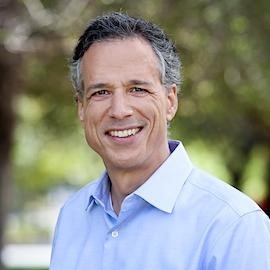
Peter M. DeMarzo is the Staehelin Family Professor of Finance, and faculty director for Educational Technology at Stanford University Business School. DeMarzo was appointed president of the American Finance Association for the 2019 term.
Professor DeMarzo received his B.A. in Cognitive Science and Applied Mathematics at the University of California, San Diego in 1984. He later continued his education and received a M.S. in Operations Research in 1985 and a Ph.D. in Economics in 1989. He began teaching at the Kellog School of Management in 1989 and Northwestern University and remained there until 1997. However, between 1995 and 1997 he was a visiting assistant professor at Stanford, after which he secured an associate professorship at the Haas School of Business of the University of California, Berkeley. He has published research on corporate investment and financing, asset securitization, financial contracting, and market regulation. Recent work has examined the optimal design of securities, compensation mechanisms, regulation of insider trading and broker-dealers, bank capital regulation, and the influence of information asymmetries on corporate disclosures and investment. He is co-author of Corporate Finance and Fundamentals of Corporate Finance (Pearson Prentice Hall 2012). He is a Research Associate of the National Bureau of Economic Research. His research has received awards including the Barclays Global Investors/Michael Brennan best paper award from the Review of Financial Studies, and the Western Finance Association Corporate Finance Award. He won the Sloan Teaching Excellence award in 2004 and 2006, and the Cheit Outstanding Teaching Award in 1998.
David S. Scharfstein (2017)

David S. Scharfstein is the Edmund Cogswell Converse Professor of Finance and Banking at Harvard Business School, also serving as Senior Associate Dean. He served as President of the American Finance Association in 2017.
Professor Scharfstein began his college career at Princeton University where he received his A.B. in 1982, and his Ph.D. in economics from MIT in 1986. After completing his education, he went to join Harvard Business School in 1986 as an Assistant Professor of Business Management, following the Sloan School of Management at MIT as an Assistant Professor of Finance in 1987. A couple of year after he was promoted to Associate Professor in 1990, and to Dai-Ichi Kanygo Bank Professor of Management and Professor of Finance, in 1994. Scharfstein has published on a broad range of topics in finance, including corporate investment and financing behavior, risk management, financial distress, capital allocation, and venture capital. His current research focuses on financial intermediation and financial regulation, including research on housing finance, financial system risk, bank lending and funding, and the growth of the financial sector. Scharfstein is currently a research associate of the National Bureau of Economic Research. He has also published 37 peer-reviewed articles on various aspects of capital management, and written working papers and 11 Harvard Business School Cases.

Campbell R. Harvey is Professor of Finance at the Fuqua School of Business, Duke University and a Research Associate of the National Bureau of Economic Research in Cambridge, Massachusetts. He served as President of the American Finance Association in 2016.
Professor Harvey obtained his doctorate at the University of Chicago in business finance. He has served on the faculties of the Stockholm School of Economics, the Helsinki School of Economics, and the Booth School of Business at the University of Chicago. He has also been a visiting scholar at the Board of Governors of the Federal Reserve System. He was awarded an honorary doctorate from Svenska Handelshögskolan in Helsinki. He is a Fellow of the American Finance Association.
Harvey has received three Jensen prizes for the best corporate finance paper in the Journal of Financial Economics, two Notable Contribution awards from the American Accounting Association for the best accounting paper published in any journal over the past five years, an Amundi Smith-Breeden distinguished paper, seven Graham and Dodd Awards/Scrolls for excellence in financial writing from the CFA Institute, and the 2016 and 2015 Best Paper Awards from The Journal of Portfolio Management. He has published over 125 scholarly articles on topics spanning investment finance, emerging markets, corporate finance, behavioral finance, financial econometrics, financial accounting and computer science.
Harvey is a Founding Director of the Duke-CFO Survey. This widely watched quarterly survey polls over 1,500 CFOs worldwide.
Harvey edited The Journal of Finance – the leading scientific journal in his field and one of the premier journals in the economic profession from 2006-2012.
His publications can be found at http://people.duke.edu/~charvey/research.htm
Follow him on Twitter @camharvey
Sources of information for Campbell Harvey
https://en.wikipedia.org/wiki/Campbell_Harvey

Patrick Bolton holds a B.A. in economics from the University of Cambridge and a B.A. in political science from the Institut d’Etudes Politiques de Paris. He served in the French army from 1979-1980. Then in 1986, he received his Ph.D. from the London School of Economics.
Dr. Bolton began his academic career as an assistant professor at the University of California at Berkeley. In 1987, he accepted a position with Harvard University’s economics department and continued his professorship there until 1989. Additional academic appointments include the following: Chargé de Recherche at the C.N.R.S. Laboratoire d’ Econométrie de L’ Ecole Polytechnique, from 1989-1991; Cassel Professor of Money and Banking at the London School of Economics, from 1991-1994; Chargé de cours associé at the Institut d’Etudes Europénnes de l’Université Libre de Bruxelles, from 1994-1998; and John H. Scully ’66 Professor of Finance and Economics at Princeton University, from 1998-2005.
In 2005, Professor Bolton joined the faculty of Columbia University and has since become the David Zalaznick Professor of Business at the Business School. His research and areas of interest are in contract theory and contracting issues in corporate finance and industrial organization. His work focuses on the allocation of control and decision rights to contracting parties when long-term contracts are incomplete. This issue is relevant in many different contracting areas, including the firm’s choice of optimal debt structure, corporate governance and the firm’s optimal ownership structure, vertical integration, and constitution design. Dr. Bolton’s work in industrial organization focuses on antitrust economics and the potential anticompetitive effects of various contracting practices.
Professor Bolton recently published his first book, Contract Theory, with Mathias Dewatripont and has co-edited a second book with Howard Rosenthal, Credit Markets, for the Poor. Dr. Bolton was elected to serve as president of the America Finance Association for 2015.
Sources of information for Patrick Bolton
http://www4.gsb.columbia.edu/cbs-directory/detail/586132/Patrick+Bolton
http://en.wikipedia.org/wiki/American_Finance_Association
Photograph from the Columbia Business School website

Luigi Zingales was born in Padua, Italy, where the high inflation and unemployment rate gave inspiration to him to become an economist and implement changes within the financial system. Dr. Zingales obtained a bachelor’s degree in economics (summa cum laude) from Universita Bocconi in Italy in 1987, and then completed a Ph.D. in economics from the Massachusetts Institute of Technology in 1992. Following graduation, he joined the faculty at the University of Chicago’s Booth School of Business, where he is currently the Robert C. McCormack Professor of Entrepreneurship and Finance and the David G. Booth Faculty Fellow.
Professor Zingales’s research interests include corporate governance, financial development, political economy, and the economic effects of culture. Currently, he is working on developing optimal interventions to cope with the aftermath of the financial crisis. He also co-developed the Trust Fund Index. Dr. Zingales is the co-author, with Raghuram G. Rajan , of Saving Capitalism from the Capitalists (2003) and A Capitalism for the People: Recapturing the Lost Genius of American Prosperity (2012). In the latter book, Dr. Zingales suggests that “channeling populist anger can reinvigorate the power of competition and reverse the movement toward a ‘crony system.’”
Dr. Zingales serves as a member of the committee on Capital Markets Regulation. He is also a faculty research fellow at the National Bureau of Economic Research, a research fellow for the Center for Economic Policy Research, and a fellow of the European Governance Institute. He is currently an editor for II Sole 24 Ore.
In 2003, Dr. Zingales was the winner of the Germán Bernácer Prize, which is awarded to the best European economist under 40 working in macro-finance. In 2012, Dr. Zingales was a participant in the ‘No-Brainer Economic Platform’ project of NPR’s program Planet Money. He advocated a six-part reform plan that involved eliminating all American income, corporate, and payroll taxes as well as the war on drugs and replacing the system with a broad consumption tax (including taxing formerly illegal substances). In 2012, he was named by Foreign Policy magazine one of the Top 100 Global Thinkers, “For reminding us what conservative economics used to look like.”
Sources of information for Luigi G. Zingales
http://en.wikipedia.org/wiki/Luigi_Zingales
http://www.chicagobooth.edu/faculty/directory/z/luigi-zingales
http://en.wikipedia.org/wiki/American_Finance_Association
Photograph from the nanocivis website

Robert Stambaugh received his B.A. from Dickinson College in 1974, cum laude, with honors in economics and a second concentration in mathematics. He then continued his studies to earn his MBA in 1976, and then his Ph.D. in 1981 in finance and econometrics, both from the University of Chicago. While he was completing his graduate work, Dr. Stambaugh secured a position with Ford Motor Company, as a financial analyst, where he worked from 1976–1977. Prior to joining the Wharton School of the University of Pennsylvania in 1988, he was a professor of finance at the University of Chicago. Professor Stambaugh also served as a visiting professor at Harvard University as a Marvin Bower Fellow from 1997-1998.
Currently, Dr. Stambaugh is the Miller Anderson & Sherrerd Professor of Finance at the Wharton School of the University of Pennsylvania. He is also a fellow of the Financial Management Association, and a research associate of the National Bureau of Economic Research.
Professor Stambaugh has served as the editor of the Journal of Finance, an editor of the Review of Financial Studies, an associate editor of those journals as well as the Journal of Financial Economics, and a member of the first editorial committee of the Annual Review of Financial Economics. His research focuses on empirical asset pricing, and he often uses Bayesian analysis in his papers. Dr. Stambaugh has published numerous articles on topics such as return predictability, asset pricing tests, portfolio choice, parameter uncertainty, liquidity risk, volatility, performance evaluation, investor sentiment, and active-versus-passive investing. His research awards include a Smith-Breeden first prize for an article in the Journal of Finance as well as three Fama-DFA second prizes for articles in the Journal of Financial Economics.
Sources of information for Robert Stambaugh
https://fnce.wharton.upenn.edu/profile/985/
http://en.wikipedia.org/wiki/Robert_F._Stambaugh
http://en.wikipedia.org/wiki/American_Finance_Association
Photograph from the Wharton Club of Northern California website
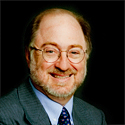
Sheridan Titman received a B.S. from the University of Colorado, Boulder, in 1975, an M.S. from Carnegie Mellon University in 1978, and a Ph.D. from Carnegie Mellon University in 1981. He has been affiliated with the University of Texas at Austin since 1997.
Professor Titman is currently the Walter W. McAllister Centennial Chair in Financial Services, Department of Finance at UT Austin. Prior to joining the UT Austin faculty, Dr. Titman worked at Boston College; Hong Kong University of Science & Technology, where he was one of the founding professors of the School of Business and Management; and the University of California Los Angeles, where he served as chair of the Department of Finance and vice chairman of the UCLA management school faculty. Dr. Titman is also currently the director of the Energy Management and Innovation Center at UT Austin.
Professor Titman is well known for his research on finance and real estate topics, as well as corporate governance. He is currently a research associate of the National Bureau of Economic Research. Dr. Titman has served on the editorial boards of leading academic journals, including the Journal of Finance and the Review of Financial Studies. Dr. Titman won the Smith-Breeden Prize for the best finance research paper published in the Journal of Finance, the GSAM best paper award for the Review of Finance, and was a recipient of the Batterymarch Fellowship. He has also co-authored three finance textbooks, Financial Markets and Corporate Strategy Valuation: The Art and Science of Corporate Investment Decisions, and Financial Management: Principles and Applications.
Dr. Titman was an academic advisor to the registered investment advisory firm, Gerstein Fisher. In the 1988-89, academic year, he worked in Washington D. C. as the special assistant to the Treasury Assistant Secretary for Economic Policy. In 2012, is also a former president of the Western Finance Association.
Sources of information for Sheridan Titman
http://acsprod.mccombs.utexas.edu/FEG/index.asp?uid=57
http://www.mccombs.utexas.edu/directory/profiles/titman-sheridan
http://en.wikipedia.org/wiki/Sheridan_Titman
http://www.nber.org/people/sheridan_titman
http://en.wikipedia.org/wiki/American_Finance_Association
Photograph from the Reit website

Raghuram Rajan graduated from the Indian Institute of Technology, Delhi with a bachelor’s degree in electrical engineering in 1985, after which he acquired a postgraduate diploma in business administration from the Indian Institute of Management Ahmedabad in 1987. He received a Ph.D. in management from the Massachusetts Institute of Technology in 1991.
After completing his doctorate, Professor Rajan joined the Booth School of Business at the University of Chicago, where he is the Eric J. Gleacher Distinguished Service Professor of Finance there. Dr. Rajan is currently on leave from the U of C, assuming charge as the Governor of the Reserve Bank of India since September 2013.
Dr. Rajan’s research interests span the topics of banking, corporate finance, and economic development. His papers have been published in top economics and finance journals, and he has served on the editorial board of the American Economic Review and the Journal of Finance. He has written a book with Luigi Zingales entitled Saving Capitalism from the Capitalists. He then wrote Fault Lines: How Hidden Fractures Still Threaten the World Economy, and was awarded the Financial Times-Goldman Sachs prize for best business book in 2010. In January 2003, the American Finance Association awarded Dr. Rajan the inaugural Fischer Black Prize, given every two years to the financial economist under age 40 who has made the most significant contribution to the theory and practice of finance.
Dr. Rajan has held many administrative positions throughout his career. From 2003-2006, he was the chief economist at the International Monetary Fund. In 2008, Indian Prime Minister Dr. Manmohan Singh appointed Dr. Rajan as an honorary economic adviser. In 2012, he was appointed as Chief Economic Adviser to the Government of India. In 2013, it was announced that Dr. Rajan would take over as the RBI Governor, and serve for a term of three years. He has also chaired the Indian government’s Committee on Financial Sector Reforms. Dr. Rajan is currently a member of the American Academy of Arts and Sciences.
Sources of information for Raghuram G. Rajan
http://www.chicagobooth.edu/faculty/bio.aspx?person_id=12825569280
http://en.wikipedia.org/wiki/Raghuram_Rajan
http://en.wikipedia.org/wiki/American_Finance_Association
Photograph from the General Knowledge Today website
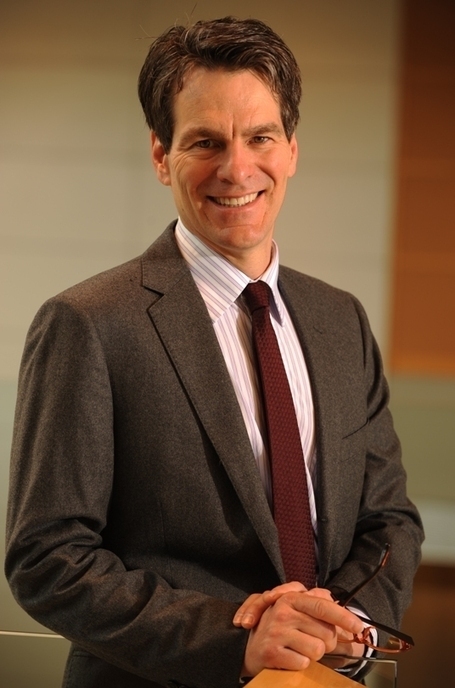
John Cochrane received a B.A. in physics from the Massachusetts Institute of Technology and earned his Ph.D. in economics at the University of California at Berkley. He was hired by the economics department at the University of Chicago prior to joining the Booth School in 1994 and is currently the AQR Capital Management Professor there. From 2000-01, he was also a visiting professor at the University of California Los Angeles Anderson School of Management.
The central theme of Professor Cochrane’s research is that macroeconomics and finance should be linked. A theory needs to explain how, given the observed prices and financial returns, households and firms decide on consumption, investment, and financing; and how, in equilibrium, prices and financial returns are determined by households and firms decisions.
Professor Cochrane’s recent financial publications include the book, Asset Pricing, and articles on dynamics in stock and bond markets, the volatility of exchange rates, the term structure of interest rates, the returns to venture capital, liquidity premiums in stock prices, the relation between stock prices and business cycles, and option pricing when investors can’t perfectly hedge. His publications in the field of economics include articles on the relations between deficits and inflation, the effects of monetary policy, and on the fiscal theory of the price level. Additional research topics of interest have included macroeconomics, health insurance and time-series econometrics.
Dr. Cochrane has served as a research associate for the National Bureau of Economic, a fellow of the Econometric Society, and an adjunct scholar of the CATO institute. Past positions include editor of the Journal of Political Economy and associate editor of Journal of Monetary Economics, Journal of Business, and Journal of Economic Dynamics and Control. Dr. Cochrane’s recent awards include the TIAA-CREF Institute Paul A. Samuelson Award, for his book Asset Pricing; the Chookaszian Endowed Risk Management Prize; and the Faculty Excellence Award for MBA teaching.
Sources of information for John H. Cochrane
http://faculty.chicagobooth.edu/john.cochrane/research/papers/cochrane_bio.pdf
http://en.wikipedia.org/wiki/John_H._Cochrane
http://en.wikipedia.org/wiki/American_Finance_Association
Photograph from the Chicago Booth Faculty website
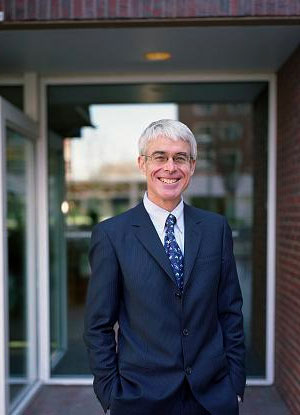
Darrell Duffie received his B.Sc.E. from the University of New Brunswick in 1975. He then earned his M.Ec. from the University of New England in 1980. In 1984, he obtained his Ph.D. from Stanford University, and subsequently was hired as a member of the finance faculty there. He is currently the Dean Witter Distinguished Professor of Finance at The Graduate School of Business at Stanford.
Professor Duffie’s research interests include over-the-counter markets, banking, financial risk management, credit risk, valuation and hedging of derivative securities, term structure of interest rate modeling, financial innovation, and market design. His most recent research focuses on asset pricing, credit risk, fixed-income securities, and over-the-counter markets.
Dr. Duffie is interested in how capital moves from one segment of asset markets to another, and the implications of imperfect trading opportunities for asset price behavior. He and several of his colleagues have obtained recent results on portfolio credit risk, based on the assumption that there are unobservable common default-risk factors. Duffie’s recent books include How Big Banks Fail (Princeton University Press, 2010), Measuring Corporate Default Risk (Oxford University Press, 2011), and Dark Markets (Princeton University Press, 2012).
Dr. Duffie is currently a fellow and member of the Council of the Econometric Society, a research associate of the National Bureau of Economic Research, a fellow of The American Academy of Arts and Sciences, as well as the 2003 IAFE/Sunguard Financial Engineer of the Year. He is also a member of the Financial Advisory Roundtable of the Federal Reserve Bank of New York, and a member of the board of directors of Moodys Corporation (since 2008). Dr. Duffie currently chairs the Market Participants Group, charged by the Financial Stability Board with recommending reforms to Libor, Euribor, and other interest rate benchmarks.
Sources of information for J. Darrell Duffie
http://www.gsb.stanford.edu/users/duffie
http://en.wikipedia.org/wiki/Darrell_Duffie
http://en.wikipedia.org/wiki/American_Finance_Association
Photograph credit Asia Kepka
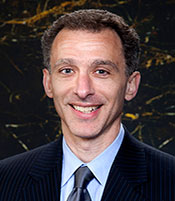
Jeremy Stein received his A.B. in economics from Princeton University (summa cum laude) in 1983 and his Ph.D. in economics from the Massachusetts Institute of Technology in 1986. Since May of 2012, Dr. Stein has served as a member of the Board of Governors of the Federal Reserve System. Prior to joining the board, Dr. Stein began his academic career as an assistant professor of finance at the Harvard Business School in 1987, and remained there until 1990. He then joined the finance faculty at M.I.T.’s Sloan School of Management for ten years, later receiving the honor of J.C. Penney Professor of Management. He returned to Harvard in 2000, where he taught courses in finance in the undergraduate and Ph.D. programs. He is currently the Moise Y. Safra Professor of Economics there.
Dr. Stein’s research spans a wide range of topics that include behavioral finance and stock-market efficiency, corporate investment and financing decisions, risk management, capital allocation inside firms, banking, financial regulation, and monetary policy. In 2002, he received the Fama-FDA prize for his paper “Breadth of Ownership and Stock Returns” (with Joseph Chen and Harrison Hong). This annual prize is awarded to authors who produce the best capital markets and asset pricing research papers published in the Journal of Finance Economics.
Dr. Stein has served on the editorial boards of several prominent economic and finance journals, including the Journal of Finance, the American Economic Review, the Journal of Financial Economics, the Journal of Economic Perspectives, and the Quarterly Journal of Economics. He is currently a fellow of the American Academy of Arts and Sciences, a former research associate at the National Bureau of Economic Research, and a member of the Federal Reserve Bank of New York’s Financial Advisory Roundtable. From February-July of 2009, he served in the Obama Administration as a senior advisor to the Treasury Secretary and on the staff of the National Economic Council.
Sources of information for Jeremy C. Stein
http://www.federalreserve.gov/aboutthefed/bios/board/stein.htm
http://scholar.harvard.edu/files/stein/files/stein-vita-december_2011_0.pdf
http://en.wikipedia.org/wiki/American_Finance_Association
Photograph from the Board of Governors of the Federal Reserve System website

Kenneth French obtained a B.S. in 1975 from Lehigh University in mechanical engineering. At the University of Rochester, he earned an MBA in 1978, an M.S. in finance in 1981, and a Ph.D. in finance in 1983.
Currently, he is the Roth Family Distinguished Professor of Finance at the Tuck School of Business at Dartmouth College. Prior to joining Dartmouth in 2001, Professor French was on the faculty of the Massachusetts Institute of Technology’s Sloan School of Management, the Yale School of Management, and the University of Chicago’s Booth School of Business.
Professor French is an authority on the behavior of security prices and investment strategies. He and co-author Eugene F. Fama researched the value effect and the three-factor model, and were included in articles such as “The Cross-Section of Expected Stock Returns” and “Common Risk Factors in the Returns on Stocks and Bonds.” His current research focuses on tests of asset pricing, the tradeoff between risk and return in domestic and international financial markets, and the relation between capital structure and firm value.
Drs. French and Fama wrote a series of papers that questioned the validity of the Capital Asset Pricing Model (CAPM). These papers describe two factors above and beyond a stock’s market beta, which can explain differences in stock returns: market capitalization and value. They also offer supportive evidence that a variety of patterns in average returns, often labeled as “anomalies” in past work, can be explained with their Fama-French three-factor model. Dr. French has written articles for prominent academic journals, including the Journal of Finance, the Journal of Financial Economics, Review of Financial Studies, American Economic Review, the Journal of Political Economy, and the Journal of Business. Among other accomplishments, Professor French was the vice president of the American Finance Association in 2005 as well as a Rochester Distinguished Scholar. In 2007, he became a fellow to the American Academy of Arts and Sciences.
Currently, Dr. French is a research associate at the National Bureau of Economic Research, as well as an advisory editor of the Journal of Financial Economics. He is a fellow of the American Finance Association and the American Academy of Arts and Sciences, and a director at Dimensional Fund Advisors, where he also works as a consultant and head of investment.
Sources of information for Kenneth R. French
http://mba.tuck.dartmouth.edu/pages/faculty/ken.french/index.html
http://en.wikipedia.org/wiki/Kenneth_French
http://en.wikipedia.org/wiki/American_Finance_Association
Photograph from the Dartmouth Tuck School of Business website

Richard Green (1953-2015) obtained his B.A. in English from Pomona College in 1976. In 1979, he obtained his M.S. in business administration from the University of Wisconsin-Madison. In 1982, he received his Ph.D. in finance, also from the University of Wisconsin-Madison.
From 1990 to 1999, Dr. Green served as a professor of financial economics at Carnegie Mellon University’s Graduate School of Industrial Administration. From 1999-2015, Dr. Green was the Richard M. and Margaret S. Cyert Professor of Economics and Management. He also served as senior associate dean at Carnegie as a visiting professor at the Stockholm School of Economics and the University of British Columbia.
Professor Green’s research interests were in the areas of taxation and asset pricing. He has been an editor and associate editor of several prominent journals, including the Journal of Financial Economics, the Journal of Finance, Review of Financial Studies, Management Science, and the Journal of Financial and Quantitative Analysis.
Dr. Green has numerous professional affiliations. He has served as president for the Western Finance Association from 1999-2000. He also served as vice president of the Society for Financial Studies from 1997-1999. In 2011, Dr. Green was appointed as a research associate to the National Bureau of Economic Research. He was also a fellow at TIAA-CREF from 2005-2010.
In 1995, he received the award for C.G.S. Teaching Excellence Award, University of British Columbia in 1995. He also was the recipient of the George Leland Bach Teaching Award, GSIA in 1996.
Sources of information for Richard C. Green
http://www.nber.org/people/richard_green
http://en.wikipedia.org/wiki/American_Finance_Association
Photograph from the Carnegie Mellon Tepper School of Business website

John Campbell received a B.A. from Oxford University in 1979. He then earned his Ph.D. from Yale University in 1984. Dr. Campbell holds honorary doctorates from the University of Maastricht and the University of Paris Dauphin. Following graduation, he spent the next ten years teaching at Princeton, before accepting a teaching position at Harvard University in 1994. At Harvard, Dr. Campbell helped to oversee the investment of the endowment as a board member of the Harvard Management Company, while also serving as chair of the Department of Economics. He is the current Morton L. and Carole S. Olshan Professor of Economics at Harvard University.
Professor Campbell has published over 80 articles in finance and economics journals. His topics of research include finance and macroeconomics, fixed-income securities, equity valuation, and portfolio choice. He is the author of The Econometrics of Financial Markets (with Andrew Lo and Craig MacKinlay), Strategic Asset Allocation: Portfolio Choice for Long-Term Investors (with Luis Viceira), and The Squam Lake Report: Fixing the Financial System (with the Squam Lake Group of financial economists). In 2005, he received the Graham and Dodd Award for his Financial Analysts Journal paper with Luis Viceira entitled “The Term Structure of the Risk-Return Tradeoff.”
Dr. Campbell is currently a Fellow of the American Academy of Arts and Sciences. He is also a research associate and former director of the Program in Asset Pricing at the National Bureau of Economic Research. He is a fellow of the Econometric Society and the American Academy of Arts and Sciences, and a corresponding fellow of the British Academy and Honorary Fellow of Corpus Christi College, Oxford.
Dr. Campbell was a consultant for PanAgora Asset Management prior to assisting with the founding of Arrowstreet Capital, LP. He currently holds a seat on the firm’s Investment Committee. He has also directed the Asset Pricing program at the National Bureau of Economic Research.
Sources of information for John Y. Campbell
http://scholar.harvard.edu/campbell/biocv
http://en.wikipedia.org/wiki/John_Y._Campbell
http://scholar.harvard.edu/campbell/home
http://en.wikipedia.org/wiki/American_Finance_Association
Photograph from the European Finance Association website
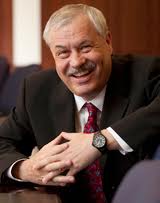
René Stulz received his doctorate from the Massachusetts Institute of Technology. He was awarded a Marvin Bower Fellowship from the Harvard Business School, a Doctorat Honoris Causa from the University of Neuchâtel, and the Risk Manager Award of the Global Association of Risk Professionals.
Professor Stulz has served as the Everett D. Reese Chair of Banking and Monetary Economics and the director of the Dice Center for Research in Financial Economics at the Ohio State University since 1996. Prior to that, he taught at the Massachusetts Institute of Technology, the University of Chicago, and the University of Rochester.
Dr. Stulz has served as editor of the Journal of Finance, the leading academic publication in the field of finance, for 12 years. He has published more than 60 papers in finance and economics journals. He is on the editorial board of more than 10 academic and practitioner journals. Professor Stulz’s research interests span a wide range of topics, including corporate finance, mergers and acquisitions, cost of capital, financial institutions, derivatives, international finance, risk management, valuation, and investments.
Dr. Stulz is a director of Banque Bonhote, the president of the Gamma Foundation, and a trustee of the Global Association of Risk Professionals. He is a member of the Asset Pricing and Corporate Finance Programs and the director of the Risk of Financial Institutions Group of the National Bureau of Economic Research. He is also currently a fellow of the American Finance Association, the Financial Management Association, and the European Corporate Governance Institute.
Professor Stulz has taught executive development programs in the United States, Europe, and Asia. He has consulted for major corporations, law firms, the New York Stock Exchange, the International Monetary Fund, and the World Bank. Dr. Stulz has served as president of the Western Finance Association in 2004. In 2004, Treasury and Risk Management magazine named him one of the 100 most influential people in finance.
Sources of information for René M. Stulz
http://fisher.osu.edu/fin/faculty/stulz/
http://en.wikipedia.org/wiki/American_Finance_Association
Photograph from The Ohio State University Fischer College of Business website
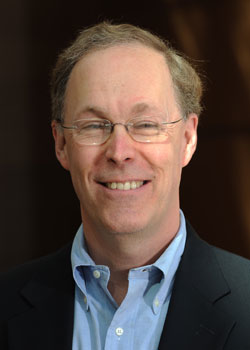
Douglas Diamond obtained an A.B. in economics from Brown University in 1975, an M.A. in 1976, an M.Phil. in 1977, and a Ph.D. in 1980 in economics, all from Yale University. During his graduate training, he had secured a position with the Board of Governors of the Federal Reserve System.
Dr. Diamond is currently the Merton H. Miller Distinguished Service Professor of Finance and Neubauer Family Faculty Fellow at The University of Chicago’s Booth School of Business. He has been affiliated with the Booth School since 1979 and is currently the co-director of the Fama-Miller Center for research in finance. He has previously taught at Yale University, Hong Kong University of Science and Technology, as well as the University of Bonn.
Professor Diamond is considered to be a pioneer for his work in finance, which has changed the way certain aspects of the financial system are viewed. He specializes in the study of financial intermediaries, financial crises, and liquidity. His most influential early research includes “Financial Intermediation and Delegated Monitoring,” in the Review of Economic Studies and “Bank Runs, Deposit Insurance, and Liquidity,” in the Journal of Political Economy, authored with Philip H. Dybvig. Professor Diamond’s work has appeared in various journals, including the Journal of Financial Economics, the Journal of Finance, Review of Economic Studies, American Economic Review, and the Journal of Political Economy.
Dr. Diamond is currently a visiting scholar at the Federal Reserve Bank of Richmond, a position that he has held since 1990. He is also a research associate for the National Bureau of Economic Research. In addition, he is on the board of directors of the Center for Research in Security Prices. Dr. Diamond is also a fellow of the Econometric Society, the American Academy of Arts and Sciences, and the American Finance Association.
Dr. Diamond is a former president of the Western Finance Association. At one point, he was the recipient for the Morgan Stanley American Finance Association Award for Excellence in Finance. The award is given for recognition of an individual’s career achievements and leadership in financial economics research.
Sources of information for Douglas W. Diamond
http://www.chicagobooth.edu/faculty/directory/d/douglas-w-diamond
http://news.uchicago.edu/article/2012/01/09/douglas-diamond-wins-morgan-stanley-afa-award-financial-economics-research
http://en.wikipedia.org/wiki/American_Finance_Association
Photograph from the Chicago Booth News website
Maureen Patricia O’Hara (2002)
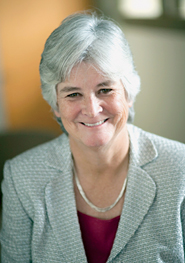
Maureen O’Hara received a B.S. in economics from the University of Illinois in 1975. She then obtained an M.S. in economics and a Ph.D. in finance, both from Northwestern University, in 1976 and 1979, respectively. Dr. O’Hara is the recipient of honorary doctorates from Facultés Universitaires Catholiques à Mons, Belgium, and Universität Bern, Switzerland.
In 1979, Dr. O’Hara joined the faculty at the Johnson Graduate School of Management at Cornell University. She is currently the Robert W. Purcell Professor of Finance there. Professor O’Hara’s primary research interests focus on market microstructure. She is the author of numerous journal articles as well as the book Market Microstructure Theory (Blackwell: 1995). Dr. O’Hara has publishes on a broad range of topics that include banking and financial intermediaries, law and finance, and experimental economics. She has also served as an editor of numerous publications.
Dr. O’Hara is currently chairman of the board of directors of Investment Technology Group, Inc. and serves on the board of directors of NewStar Financial, where she is on the audit and governance committees. She also serves on the board of trustees of Teachers Insurance and Annuity Association (TIAA-CREF). Dr. O’Hara is a member of the CFTC-SEC Emerging Regulatory Issues Task Force, the Global Advisory Board of the Securities Exchange Board of India (SEBI), and the Advisory Board of the Office of Financial Research, United States Treasury. She has consulted for a number of companies and organizations, including Microsoft, Merrill Lynch, Credit Suisse, the New York Stock Exchange, Bristol-Meyers Squibb, and the World Federation of Exchanges. Dr. O’Hara has also served as president of the Western Finance Association, the Financial Management Association, the Society for Financial Studies, and the International Atlantic Economic Society.
Sources of information for Maureen P. O’Hara
http://www.johnson.cornell.edu/faculty/profiles/ohara/
http://web.law.columbia.edu/capital-markets/program-fellows/maureen-ohara
http://en.wikipedia.org/wiki/American_Finance_Association
Photograph from the Systemic Risk Council website
George M. Constantinides (2001)

George Constantinides earned a B.A. in physics, and then later an M.A., both from Oxford University. He later came to the United States in 1970 on a Fulbright travel scholarship to pursue further graduate studies. In 1972, he received an MBA, and then a Ph.D. in business management in 1975, both from Indiana University. He was also a Marvin Bower Fellow from 1985-1986 at Harvard University.
Professor Constantinides joined the Chicago Booth School of Business faculty in 1979, having previously taught at Carnegie Mellon University for five years. At the Booth School, he was named the Leo Melamed Professor of Finance. His research interests include the causes of the historically observed premium of equity returns over bond returns, the pricing and hedging of fixed-income securities, options, futures, and other derivatives, the effects of transaction costs and taxes on the pricing and hedging of derivatives, and portfolio management.
Dr. Constantinides has published numerous papers in distinguished academic periodicals. Several noteworthy articles include the following: “Mispricing of S&P 500 Index Options,” written with J. C. Jackwerth and S. Perrakis in the Review of Financial Studies; Rational Asset Prices, in the Journal of Finance; and “Junior Can’t Borrow: A New Perspective on the Equity Premium Puzzle,” written with J. B. Donaldson and R. Mehra in the Quarterly Journal of Economics.
Dr. Constantinides is currently a research associate at the National Bureau of Economic Research and serves as a director and trustee of the Dimensional Fund Advisors’ family of funds and trusts. He has held numerous prior professional affiliations throughout this career. Some of these include former president of the Society for Financial Studies, director of the Western Finance Association, editor-in-chief of Foundations and Trends in Finance, and advisory editor for the World Scientific Handbook in Financial Economics Series.
Sources of information for George M. Constantinides
http://www.chicagobooth.edu/faculty/bio.aspx?person_id=12824690688
http://en.wikipedia.org/wiki/American_Finance_Association
Photograph from the Chicago Booth School of Business website
Frank Allen received his B.A. in economics and computing studies in 1977 from the University of East Anglia. He received an M.A. in economics in 1979, and then completed his doctorate in 1980, both from the University of Oxford. Some of his visiting teaching appointments have included the Universities of Oxford, Tokyo, and Frankfurt; Princeton University; and an adjunct appointment at New York University.
Dr. Allen has been a professor at the Wharton School of the University of Pennsylvania since 1980. In 1994, he was named the Nippon Life Professor of Finance and Economics at the Wharton School of Business. He has won many Wharton teaching awards throughout his academic career. He has held the position of co-director of Financial Institutions Center at Wharton since 2000.
Professor Allen’s research interests over the years have included corporate finance, asset pricing, and the economics of information. Throughout his career, he has maintained a lengthy list of publications. He was also co-author of the widely known finance textbook Principles of Corporate Finance.
Dr. Allen has held the position of Associate Editor of Financial Management since 1991; managing editor of the Review of Finance since 2012; advisory editor of the Journal of Financial Markets, Journal of Financial Services Research, and Journal of Financial Stability. He has also served as the director of The Glenmede Fund since 1991. Other previously held positions have included vice-dean and director of Doctoral Programs at Wharton (1990-93) and associate director of Doctoral Programs at Wharton (1988-90). He has served as an editor for several of the world’s top academic journals for both finance and economics. He currently serves as an advisor to Fair Observer, an online magazine on global issues of finance, economics, future strategy, and editorial policy.
Sources of information for Franklin Allen
http://www.fairobserver.com/profile/fallen
https://fnce.wharton.upenn.edu/profile/903/
http://en.wikipedia.org/wiki/American_Finance_Association
Photograph from the Wharton Global Alumni Forum website
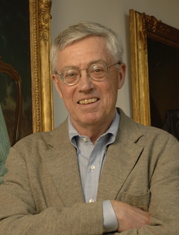
Hans Stoll received his A.B. in economics in 1961 from Swarthmore College, his MBA in 1963 and his Ph.D. in 1966, both from the University of Chicago. Prior to accepting a faculty position at Vanderbilt University in 1980, he had taught at the Wharton School of the University of Pennsylvania since 1966. Dr. Stoll has also been a visiting professor at the Board of Governors of the Federal Reserve System from 1968-1969, and he served on the staff of the Institutional Investor Study of the Securities and Exchange Commission from 1969-1970. From 1976-1977, he was a Senior Fulbright-Hays visiting lecturer at ESSEC in Paris, France. He also was a visiting professor at the University of Chicago (1975-1976), at the University of Karlsruhe (1986), and at the University of British Columbia (July, 1990). In 2007, he received an honorary doctorate degree from Goethe University, Frankfurt, Germany.
Dr. Stoll is currently the Anne Marie and Thomas B. Walker, Jr., Professor of Finance, Emeritus, and Director of the Financial Markets Research Center at the Owen Graduate School of Management at Vanderbilt University. Throughout his career, he has published several books and more than 60 articles on subjects ranging from the forward foreign exchange market, options, commodity futures, small business financing, regulation of securities markets, stock market structure and volatility, and many other topics. Professor Stoll is well known for developing and testing the put-call parity relation for option prices, for modeling and testing the behavior of securities markets dealers, for his work on program trading and the “triple witching hour,” and for his work on the sources and components of the bid-ask spread.
In 1996, Dr. Stoll received the Earl Sutherland Prize, which is awarded to individuals for outstanding research across all fields at Vanderbilt University. He has also served as president of the Western Finance Association, and associate editor of the Journal of Finance and the Journal of Financial Economics. Dr. Stoll has been a director of the American Finance Association, the Financial Management Association, and the Institute for the Study of Security Markets. He is currently an advisory editor of the Journal of Financial Markets and the Multinational Finance Journal. He is also an associate editor of the Journal of Financial and Quantitative Analysis, the Journal of Derivatives, and Financial Management.
Sources of information for Hans R. Stoll
https://www.owen.vanderbilt.edu/faculty-and-research/faculty-directory/faculty-profile.cfm?id=137
http://en.wikipedia.org/wiki/American_Finance_Association
Photograph from the Vanderbilt University Owen Graduate School of Management website
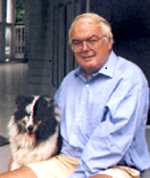
Edwin Elton completed his undergraduate work in 1965 at Carnegie Mellon University. He then completed an M.S. and a Ph.D. in industrial administration, 1965 and 1971 respectively, also at Carnegie. Dr. Elton is currently the Nomura Professor of Finance at the Stern School of Business of New York University. Dr. Elton is also a fellow of the American Finance Association and the Institute for Quantitative Analysis.
Throughout his career, Professor Elton has authored or co-authored eight books and more than 110 articles. The eighth edition of his book, Modern Portfolio Theory and Investment Analysis, is the standard textbook used in most leading graduate schools of business. His articles have appeared in the Journal of Finance, Review of Financial Studies, Review of Economics and Statistics, Management Science, the Journal of Financial Economics, the Journal of Business, Oxford Economic Papers, and the Journal of Financial and Quantitative Analysis. His collected works in investments are published in three volumes: two by MIT Press, and one by World Scientific.
Dr. Elton has served as co-editor of the Journal of Finance, and an associate editor of Management Science. Professor Elton has served as a portfolio theory and investment management consultant for many major financial institutions in Asia, Europe, and the United States. He was a senior research fellow at the International Institute of Management in Berlin, and a visiting scholar at the European Institute for Advanced Studies in Management (EIASM) in Brussels and at Katholieke Universiteit Leuven.
Professor Elton is a recipient of the distinguished research award by the Eastern Finance Association. He is also a recipient of the Graham Dodd award for research in investments and the James Vertin Lifetime Achievement Award from the Financial Analyst Federation. In addition, Dr. Elton was also named Distinguished Scholar by the Eastern Finance Association.
Sources of information for Edwin J. Elton
http://pages.stern.nyu.edu/~eelton/
http://en.wikipedia.org/wiki/American_Finance_Association
Photograph from the New York University Stern School of Business website
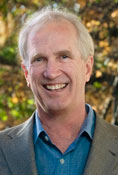
Hayne Ellis Leland received his bachelor’s degree in economics from Harvard University. He obtained a master’s degree at the London school of Economics, and then returned to Harvard to complete his Ph.D. Upon completion of his doctorate, Dr. Leland worked as an assistant professor at Stanford University from 1968 to 1974.
Dr. Leland is currently the Arno Rayner Professor Emeritus of Finance and Management at The University of California Berkeley’s Haas School of Business. He has been affiliated with the university since 1974. From 1991 – 2001, he served as the director of the Berkeley Program in Finance.
Professor Leland has published articles on investment theory, optimal portfolio choice, and dynamic hedging. Current research interest include structural modeling of credit risk, dynamic models of optimal leverage and agency costs, optimal investment strategies in the presence of transaction costs, and performance measurement: beyond mean-variance analysis. Recent work has focused on credit risk, optimal financing, and risk management by corporations. His research has received numerous prizes for excellence, and he has given keynote speeches at the American Finance Association and the Financial Management Association.
Dr. Leland has won numerous awards throughout his career. In 2008, he won the Stephen A. Ross Prize in Financial Economics, which is awarded to a significant paper in finance published in the last 15 years. Also in 2008, Professor Leland was awarded the Lifetime Achievement Award by the Financial Intermediation Research Society. Additional honors include being named “Businessman of the Year” by Fortune Magazine in 1987, winning the Graham and Dodd Award in 1999, and winning the Roger Murray Prize in 1997. More recently, Dr. Leland became the first recipient of the Stephen A. Ross Prize from the Foundation for the Advancement of Research in Financial Economics (FARFE) for his research in corporate debt pricing and capital structure.
Sources of information for Hayne E. Leland
http://facultybio.haas.berkeley.edu/faculty-list/leland-hayne
http://en.wikipedia.org/wiki/American_Finance_Association
Photograph from the University of California Haas School of Business website

Eduardo Schwartz received a B.Eng in industrial engineering from the University of Chile in 1963, and then completed a M.Sc. in business administration and a doctorate degree in finance from the University of British Columbia in 1973 and 1975, respectively. He has served on the faculty at the University of British Columbia and was a visiting professor at the London Business School and the University of California at Berkeley. Professor Schwartz was a recipient of a Doctor Honoris Causa by the University of Alicante in Spain and by the Copenhagen Business School as well.
Dr. Schwartz is currently the California Professor of Real Estate and Professor of Finance at the Anderson Graduate School of Management at the University of California Los Angeles. His recent research interests include pricing internet companies, interest rate models, asset allocation issues, evaluating natural resource investments, the stochastic behavior of commodity prices and valuing patent-protected research and development projects. He has written more than 80 articles, two monographs, and numerous chapters and special reports on assets and securities pricing. He has served as an associate editor for the Journal of Finance, the Journal of Financial Economics, the Journal of Financial and Quantitative Analysis, and many others.
Professor Schwartz is well known for his pioneering research in the area of derivatives. He is one of the first researchers to develop the real options method of pricing investments under uncertainty. Additional significant contributions to the field include the Longstaff-Schwartz model, the Longstaff-Schwartz method for evaluation options by Monte Carlo Simulation, and the use of Finite difference methods for option pricing. He is also co-editor, with Lenos Trigeorgis, on the book Real Options and Investment Under Uncertainty, which is a compilation of recent papers and classic research in the field.
Dr. Schwartz is past president of the Western Finance Association. He is also a fellow of the American Finance Association and the Financial Management Association International, as well as a research associate for the National Bureau of Economic Research. In 2000, he received the Graham and Dodd Award for his paper, “Rational Pricing of Internet Companies,” published in the Financial Analysts Journal. Dr. Schwartz has served as a consultant to numerous governmental agencies, banks, investment banks and industrial corporations.
Sources of information for Eduardo S. Schwartz
http://www.anderson.ucla.edu/faculty/finance/faculty/schwartz
http://en.wikipedia.org/wiki/Eduardo_Schwartz
http://www.nber.org/vitae/vita667.htm
http://en.wikipedia.org/wiki/American_Finance_Association
Photograph from the Norwegian School of Economics website
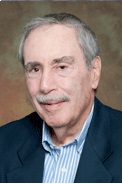
Martin Gruber received an S.B. in chemical engineering from the Massachusetts Institute of Technology in 1959. He then went on to obtain an MBA in production management in 1961, and a Ph.D. in financial economics in 1966, both at Columbia University. He also was awarded the degree of Docteur “honoris causa” by the University of Liege, Belgium. In 1965, Professor Gruber joined the Leonard N. Stern School of Business of New York University, and has been a Nomura Professor of Finance there since 1987. He is currently Professor Emeritus and Scholar in Residence there as well.
Dr. Gruber is the current director, a member of the executive committee, and a member of the investment committee for the National Bureau of Economic Research. He is a fellow of the American Finance Association, the Financial Management Association, and the Institute for Quantitative Research in Finance. Beginning in 1995, he had served as Finance Department Chairman at New York University for nine years.
Dr. Gruber’s current research interests include portfolio theory and management, mutual funds structure and performance, and pension funds. The ninth edition of his book, Modern Portfolio Theory and Investment Analysis, is one of the leading texts in graduate schools of business. In addition, he has published six other books in investment analysis and portfolio management. Professor Gruber has written over 100 articles which have appeared in the Journal of Finance, Review of Economics and Statistics, the Journal of Financial Economics, the Journal of Business, Management Science, the Journal of Financial and Quantitative Analysis, Operations Research, Oxford Economic Papers and the Journal of Portfolio Management.
Professor Gruber was named a distinguished scholar by the Eastern Finance Association, and has received the Graham and Dodd Award for research in investments. In 2004, he was awarded the James R. Vertin Award by AIMR in recognition of his research notable for its relevance and enduring quality to investment professionals.
Sources of information for Martin J. Gruber
http://pages.stern.nyu.edu/~mgruber/
http://en.wikipedia.org/wiki/American_Finance_Association
Photograph from the New York University Stern website
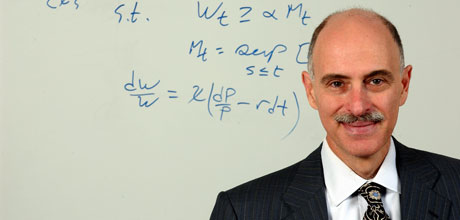
Sanford Grossman received a B.A., with honors, in economics from the University of Chicago in June 1973. He then continued his studies at the U of C to earn an A.M. in economics 1974 and a Ph.D. in 1975. Since receiving his doctorate, he has held academic appointments at Stanford University; the University of Chicago; Princeton University, as the John L. Weinberg Professor of Economics, 1985–1989; and at the University of Pennsylvania’s Wharton School of Business. At Wharton, he held the position of Steinberg Trustee Professor of Finance from 1989 to 1999 (a title now held in emeritus status) and also served as the director of the Wharton Center for Quantitative Finance from 1994 to 1999.
An American economist and hedge fund manager, Professor Grossman is considered an expert on corporate structure, property rights, risk management, and securities markets. He has published widely in leading economic and business journals, including American Economic Review, Journal of Econometrics, Econometrica, and the Journal of Finance. In addition, his research in macroeconomics, finance, and risk management has earned him numerous awards. For example, in 1987, he was awarded the John Bates Clark Medal, given by the American Economic Association, to recognize the nation’s most outstanding economist under the age of 40. In 2002, he received the Universities Professional Achievement Citation. He was also awarded the Roger F. Murray Prize in 1988.
Dr. Grossman is currently chairman and chief executive officer at Quantitative Financial Strategies and Grossman Asset Management, a hedge fund he founded in 1988 to develop investment models based on his research. It is an alternative investment management firm that uses financial investment models based on Grossman’s research in economics and quantitative finance. Previously, Dr. Grossman served as an economist with the Board of Governors of the Federal Reserve System (1977–1978); and was a public director of the largest United States options and futures exchange, the Chicago Board of Trade (1992–1996).
Sources of information for Sanford J. Grossman
http://www.nber.org/vitae/vita242.htm
http://ideas.repec.org/e/pgr108.html
http://en.wikipedia.org/wiki/Sanford_J._Grossman
http://www.nndb.com/people/055/000169545/
http://alumniandfriends.uchicago.edu/site/c.mjJXJ7MLIsE/b.4700047/k.9BFD/Sanford_Grossman.htm
http://en.wikipedia.org/wiki/American_Finance_Association
Photograph from the Opzioni Binarie website
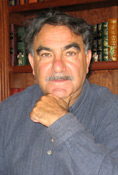
Mark Rubinstein holds an A.B. in economics from Harvard University, an MBA in finance from Stanford University, and a Ph.D. in finance from the University of California, Los Angeles. Professor Rubinstein has been associated with the Haas School of Business at the University of California at Berkeley since 1972 where he is currently a Professor Emeritus.
Professor Rubinstein is known for his work on the binomial options pricing model, also known as the Cox-Ross-Rubinstein model, as well as his early work on asset pricing in the 1970s. Along with fellow Berkeley finance professor Hayne E. Leland, Dr. Rubinstein developed the portfolio insurance financial product in 1976. He also coined the term “exotic options” with Eric Reiner. His current research interests include the history of the theory of investments as well as Christianity. His books publications include Options Markets and Rubinstein on Derivatives. Dr. Rubenstein is the author of more than 50 publications in leading finance and economic journals, and he is currently an associate editor for eight academic journals.
Dr. Rubenstein’s papers are often reprinted in survey publications. He has won numerous prizes and awards for his research and writing on derivatives, including International Financial Engineer of the Year for 1995. He also won the Graham and Dodd award in 2002 for the best article published during the year 2001 (on the rationality or efficiency of financial markets) in the Financial Analysts Journal. Out of all of his awards, he maintains that he is most proud of winning the in 2003 the Best Teacher Award in the new Masters of Financial Engineering Program at Berkeley.
In addition to teaching and research, Dr. Rubenstein has held several administrative positions throughout his career. He has served as the director for the SuperShare Services Corporation, as well as founding principle and executive vice-president of Leland O’Brien Rubinstein Associates. He was on the advisory board of the Journal of Investment Management.
Sources of information for Mark E. Rubenstein
http://www.iafe.org/html/MRubenstein.php
http://en.wikipedia.org/wiki/Mark_Rubinstein
http://facultybio.haas.berkeley.edu/faculty-list/rubinstein-mark
http://en.wikipedia.org/wiki/American_Finance_Association
Photograph from the University of California Berkley Haas School of Business website
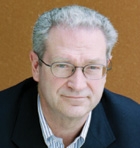
Michael Jensen earned his A.B. from Macalester College, his MBA in finance and his Ph.D. in economics, finance, and accounting, all from the University of Chicago. He has been awarded numerous honorary Doctor of Law degrees from universities around the world. He was the LaClare Professor of Finance and Business Administration at the William E. Simon Graduate School of Business Administration at the University of Rochester from 1984-1988. Professor Jensen, currently the Jesse Isidor Straus Professor of Business Administration, Emeritus, was hired as part of the faculty of the Harvard Business School in 1985.
Professor Jensen is the author of over 100 scientific papers, in addition to many articles, comments, and editorials published on a wide range of economic, finance and business-related topics. He is well known for his 1976 paper, co-authored with William H. Meckling, “Theory of the Firm: Managerial Behavior, Agency Costs, and Ownership Structure.” He co-authored a book with Kevin Murphy and Eric Wruck, CEO Pay and What to Do About It: Restoring Integrity to Both Executive Compensation and Capital-Market Relations. In 1973, Professor Jensen co-founded, with Eugene Fama and Robert Merton, the Journal of Financial Economics, and served as its managing editor from 1987 to 1997, when he became founding editor.
Dr. Jensen co-founded Social Science Electronic Publishing, Inc. and is currently its chairman. He has served as consultant and board member to various corporations, foundations and governmental agencies, and has given expert testimony before congressional and state committees and state and federal courts. He currently serves on the Advisory Boards of ESADE Business School and the Gruter Institute for Law and Behavioral Research. He was president of the Western Economic Association International.
Dr. Jensen was named “Distinguished Scholar of the Year” in 1990 by the Eastern Finance Association, and “Year’s 25 Most Fascinating Business People” by Fortune Magazine. In 2009, he was awarded the Lifetime Achievement Award for Contributions to Research in the Field of Financial Intermediation by the Financial Intermediation Society. In 2004, Dr. Jensen received the Tjalling C. Koopmans EFACT Conference Award for “extraordinary contributions to the economic sciences, and to have reached the highest standards of quality of research.” His paper “The Agency Cost of Overvalued Equity and the Current State of Corporate Finance” received the European Financial Management 2004 Readers Choice Best Paper Award. Dr. Jensen founded what is currently the Negotiations, Organizations and Markets Unit at Harvard. He is also currently the managing director of organization strategy at Monitoring Group, a strategy consulting group. Dr. Jensen founded the Managerial Economics Research Center at the University of Rochester in 1977 and served as its director until 1988.
Sources of information for Michael C. Jensen
http://drfd.hbs.edu/fit/public/facultyInfo.do?facInfo=bio&facId=6484
http://www.people.hbs.edu/mjensen/pub1.html
http://ideas.repec.org/e/pje57.html
http://en.wikipedia.org/wiki/Michael_Jensen
http://en.wikipedia.org/wiki/American_Finance_Association
http://papers.ssrn.com/sol3/cf_dev/AbsByAuth.cfm?per_id=9
Photograph from the Harvard Business School website
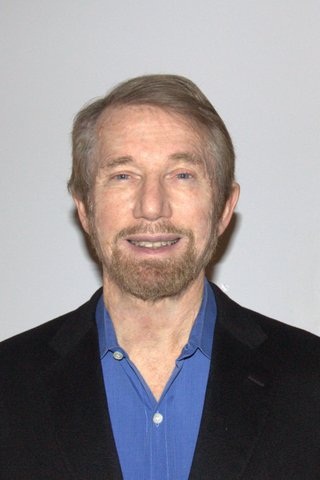
Robert Litzenberger received his B.A. from Wagner College in 1964. He then completed his Ph.D. at the University of North Carolina, Chapel Hill. Following the completion of his doctorate, he began his academic career at Carnegie-Mellon University. The following year, he joined the faculty of the Graduate School of Business at Stanford University where he eventually became C.O.G. Miller Distinguished Professor of Finance. In 1986, Dr. Litzenberg was hired as a faculty member of the Wharton School at the University of Pennsylvania as the Edward Hopkinson Professor of Investment Banking. He is currently professor emeritus at the University of Pennsylvania’s Wharton School of Business. At one point during his tenure there, he established a course in financial engineering.
Professor Litzenberger is a co-author of Foundations of Financial Economics and he has published more than 50 articles in the leading academic finance journals, many of which were co-authored with former students. Additional accolades include the following: a fellow and director of the organization; president and director of the Western Finance Association; and serving on the editorial boards of the Journal of Financial Economics, the Journal of Finance and the Journal of Financial Quantitative Analysis.
In 1995, Dr. Litzenberger joined Goldman Sachs as director of Derivative Research and Quantitative Modeling in the Fixed Income Division. Three years later, he became their firm-wide risk manager. He became a partner in 1999 and retired from an active role in 2001. In 2003, Dr. Litzenberger joined the Risk Hall of Fame and also was named the Risk Manager of the Year by Risk magazine in 2001. From 2002 to 2007, he served as an executive director of Azimuth Trust. In 2012, he was named the IAFE/SunGuard Financial Engineer of the year. Dr. Litzenberger is currently working as a consultant and board member for RGM Advisors by advising the firm on developing new trading strategies and risk management.
Sources of information for Robert H. Litzenberger
http://financialsystems.sungard.com/newsroom/newsreleases/2012/capitalmarkets122112
http://www.reuters.com/article/2012/12/21/ny-sungard-iafe-idUSnBw1MfwZLa+126+BSW20121221
http://www.amazon.com/Foundations-Financial-Economics-Chi-Fu-Huang/dp/0444013105
http://en.wikipedia.org/wiki/American_Finance_Association
Photograph from the SYMMYS website
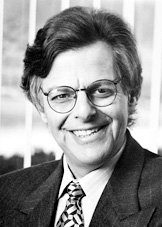
Myron Scholes had an interest in financial economics that began during his teen years. He continued to develop this interest by serving as treasurer of clubs, through trading with friends, by gambling to understand probabilities and risks, and working with his uncle’s publishing company to understand business activities. He received his B.A. from McMaster University in 1961, and his MBA and Ph.D. from the University of Chicago in 1964 and 1969, respectively. He has received honorary doctorate degrees from the University of Paris-Dauphine in 1989, McMaster University in 1990, and Katholieke Universiteit Leuven in 1998.
Professor Scholes had returned to the Graduate School of Business at the University of Chicago after visiting for the 1973-1974 academic year, specifically to work with Fischer Black, Gene Fama, and Merton Miller. He later visited Stanford University and subsequently became a permanent faculty member at their Law School, starting in 1983. Dr. Scholes is currently the Frank E. Buck Professor of Finance, Emeritus, at the Stanford Graduate School of Business.
Professor Scholes’s research focuses on understanding uncertainty and its effect on asset prices and the value of options, including flexibility options. The type of affects he has studied include tax policy on asset prices and incentives, taxation of dividends on the prices of securities, the interaction of incentives and taxes in executive compensation, capital structure issues with taxation, and the taxes on the optimal liquidation of assets. Dr. Scholes has written articles on investment banking and incentives, and has developed a new theory of tax planning under uncertainty and information asymmetry. He published a book with Mark A. Wolfson, titled Taxes and Business Strategies: A Planning Approach (Prentice Hall, 1991).
Dr. Scholes is a co-originator of the Black-Scholes options pricing model. In 1997, he was awarded the Nobel Prize for his new method of determining the value of derivatives. Dr. Scholes is also currently the Chairman of the Board of Economic Advisers of Stamos Partners. He has served as the chairman of Platinum Grove Asset Management and on the Dimensional Fund Advisors Board of Directors, as well as the American Century Mutual Fund Board of Directors and the Cutwater Advisory Board. He was a principal and limited partner at Long-Term Capital Management, L.P. and a Managing Director at Salomon Brothers. Other positions that Dr. Scholes has held include the Edward Eagle Brown Professor of Finance at the University of Chicago, senior research fellow at the Hoover Institution, director of the Center for Research in Security Prices, and professor of finance at the Massachusetts Institute of Technology Sloan School of Management.
Sources of information for Myron S. Scholes
https://gsbapps.stanford.edu/facultyprofiles/biomain.asp?id=99776729
http://nobelprize.org/nobel_prizes/economics/laureates/1997/scholes-autobio.html
http://ideas.repec.org/e/psc29.html
http://www.jstor.org/pss/3440893
http://en.wikipedia.org/wiki/Myron_Scholes
http://www.econlib.org/library/Enc/bios/Scholes.html
http://www.nndb.com/people/822/000141399/
http://topics.nytimes.com/topics/reference/timestopics/people/s/myron_s_scholes/index.html
http://en.wikipedia.org/wiki/American_Finance_Association
Photograph provided by Nobelprize.org website
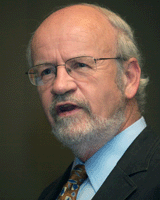
Michael Brennan received his B.Phil. in economics in 1964 at Oxford University. He earned his MBA in management from the University of Pittsburg in 1967. He then obtained his Ph.D. in business in 1970 from the Massachusetts Institute of Technology Sloan School of Management. Dr. Brennan is currently a professor of finance at the University of Manchester Business School. He is also part of the emeritus faculty at University of California Los Angeles’s Anderson School of Management, as well as at the London Business School.
Professor Brennan maintains a wide range of research interests and extensive publications that include the areas of asset pricing, corporate finance, the pricing and role of derivative securities, market microstructure, and the role of information in capital markets. His more recent work includes the following topics: the problem of asset allocation when investors face time-varying opportunity sets, initial public offerings and the allocation of control rights in the corporation, the determinants of international flows of portfolio investment, the role of convertible securities in corporate finance, and corporate hedging strategies. Another noteworthy accomplishment includes co-designing the Brennan-Schwartz interest rate model and pioneering the real options theory.
In addition to his teaching and research achievements, Dr. Brennan has served in many other administrative capacities. He has served as editor of the Journal of Finance and was the founding editor of the Review of Financial Studies. Dr. Brennan has consulted for corporations in the United States and in Canada. In 1995, he was awarded the INQUIRE Europe prize for his work on corporate hedging strategies. In 2011, Dr. Brennan was awarded an honorary Doctorate of Law from the University of Notre Dame. He has also served as a founding partner and director of the Real Options Group since its inception.
Sources of information for Michael J. Brenna
http://www.mbs.ac.uk/research/academicdirectory/profiles/michael.br ennan.aspx
http://www.anderson.ucla.edu/faculty/finance/faculty/brennan
http://en.wikipedia.org/wiki/Michael_Brennan_(finance)
http://en.wikipedia.org/wiki/American_Finance_Association
Photograph from the UCLA School of Management website

Stephen Ross holds a B.S. in physics from CalTech and a Ph.D. in economics from Harvard University. He was previously the Sterling Professor of Economics and Finance at Yale University and, before that, a professor of economics and finance at the Wharton School of the University of Pennsylvania.
Dr. Ross is currently the Franco Modigliani Professor of Financial Economics and a professor of finance at the Massachusetts Institute of Technology Sloan School of Management. He is also the chairman of Compensation Valuation, Inc. (CVI), and the principal and chief investment officer of Ross Institutional Investors, LLC (RII). He is the author of more than 100 articles in economics and finance and the co-author of an introductory textbook in finance. Dr. Ross is well known for having invented the Arbitrage Pricing Theory and the Theory of Agency, and for co-discovering risk neutral pricing and the binomial model for pricing derivatives. The models that were developed by himself and his co-workers, including term structure models and option pricing models, are now standards for pricing in major securities trading firms. Dr. Ross’s current research focuses on extending and applying the Recovery Theorem.
Dr. Ross was a fellow of the Econometric Society and a member of the American Academy of Arts and Sciences. He currently serves as an associate editor of several economic and finance journals. Dr. Ross has been a consultant to a number of investment banks as well as many major corporations. In addition, he has served as an advisor to government departments such as the United States Treasury, the Commerce Department, the Internal Revenue Service, and the EXIM Bank. He co-founded and was the co-chairman of Roll and Ross Asset Management Corp., chairman of the American Express Advisory Panel, and a former director of General Re and of CREF. Dr. Ross is currently chairman of the Investment Advisory Board of IVC International, Ltd.; a director of IV Capital, Ltd.; a former member of the board of directors of Freddie Mac; and a trustee of the California Institute of Technology (CalTech), where he chairs the investment committee.
Dr. Ross was the recipient of numerous prizes and awards, including the Graham and Dodd Award for financial writing, the Pomerance Prize for excellence in the area of options research, the University of Chicago’s Leo Melamed Prize for the best research by a business school professor, and the 1996 IAFE Financial Engineer of the Year Award. In 2006, he was the first recipient of the CME-MSRI Prize in Innovative Quantitative Application, and in 2007 he won the Jean-Jacques Laffont Prize given by the Toulouse School of Economics.
Sources of information for Stephen A. Ross
http://sloanweb.mit.edu/faculty/detail.php?in_spseqno=SP000115&co_list=F
http://www.compensationvaluation.com/
http://www.csom.umn.edu/assets/147140.pdf
http://mitsloan.mit.edu/faculty/pdf/publist/ross-pub.pdf –
http://en.wikipedia.org/wiki/Stephen_Ross_(economist)
http://www.qfinance.com/capital-markets-thinkers/stephen-a-ross
http://alumweb.mit.edu/upload/NZ/Two_Anomalies_Talk_-_New_Jersey_MIT_Club_17728.pdf
http://en.wikipedia.org/wiki/American_Finance_Association
Photograph from the MSRI Inaugural CME Group website
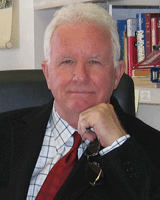
Richard Roll received a B.S. in aeronautical engineering in 1961 from Auburn University and an MBA from in 1963, both from the University of Washington. He received a Ph.D. from the Graduate School of Business at the University of Chicago in economics, finance, and statistics. In 1968, his doctoral thesis “The Behavior of Interest Rates: An Application of the Efficient Market Model to U.S. Treasury Bills” won the Irving Fisher Prize for the best American dissertation in economics.
Upon the completion of his doctoral degree, he joined the faculty at Carnegie Mellon University as an assistant professor. Later academic appointments included professorships at the European Institute for Advance Studies in Management in 1973 and Centre d’Enseignement Superiéure des Affaires in 1975. He currently holds the Joel Fried Chair in Applied Finance at the University of California Los Angeles Anderson’s School of Business, and has been affiliated with the school since 1976.
Professor Roll has published two books and more than 100 articles in peer-reviewed journals. He is a fellow of the Econometric Society. He has been an associate editor of 11 journals in finance and economics. Dr. Roll co-authored the first event study that sought to analyze how stock prices respond to an event in 1969, using price data from the newly available CRSP database.
Dr. Roll was hired by the Boeing Company in the early 1960s. He worked on the 727 and wrote the operating manual for the first stage booster of the Saturn moon rocket. He is also a principal of the consulting firm Compensation Valuation, Inc. From 1985-1987, he was a vice-president of Goldman, Sachs & Co., where he founded and directed the mortgage securities research group. Over the years, he has served as a consultant for many corporations, law firms, and government agencies, and has served on several boards. Dr. Roll is currently using his analytical skills to Rubin/Anders Economics as a principle consultant and expert witness.
Sources of information for Richard Roll
http://www.anderson.ucla.edu/x1922.xml
http://www.anderson.ucla.edu/x2964.xml
http://www.researchaffiliates.com/Our%20Firm/Our%20Team/Pages/Richard-Roll.aspx
http://en.wikipedia.org/wiki/American_Finance_Association
Photograph from the Washington State University Department of Finance and Management Science website

Robert Merton earned a B.S. in engineering mathematics from the School of Engineering and Applied Science of Columbia University, an M.S. from the California Institute of Technology, and his doctorate in economics from the Massachusetts Institute of Technology in 1970. Professor Merton served on the finance faculty of the Massachusetts Institute of Technology Sloan School from 1970 until 1988. From 1988-1998, he served as the George Fisher Baker Professor of Business Administration there. He was also the John and Natty McArthur University Professor Emeritus at the Harvard Business School from 1998 until his retirement in 2010. He is currently the Distinguished Professor of Finance at the MIT Sloan School of Management. He is also a resident scientist at Dimensional Fund Advisors, where he developed a next-generation integrated pension-management solution system that addresses deficiencies associated with traditional defined-benefit and defined-contribution plans.
Professor Merton’s research includes lifecycle finance, optimal inter-temporal portfolio selection, capital asset pricing, pricing of options, risky corporate debt, loan guarantees, and other complex derivative securities. He is the author of Continuous-Time Finance, and a co-author of Cases in Financial Engineering: Applied Studies of Financial Innovation, and The Global Financial System: A Functional Perspective, Finance, and Financial Economics.
Dr. Merton is a Nobel laureate in economics, known for his pioneering contributions to continuous-time finance, especially regarding the Black-Scholes-Merton formula. He received the inaugural Financial Engineer of the Year Award from the International Association of Financial Engineers in 1993, which also elected him a senior fellow. Derivatives Strategy magazine named him to its Derivatives Hall of Fame as did Risk magazine to its Risk Hall of Fame. He received Risk’s Lifetime Achievement Award for contributions in risk management. A distinguished fellow of the Institute for Quantitative Research in Finance (‘Q Group’) and a fellow of the Financial Management Association, Dr. Merton received the Nicholas Molodovsky Award from the Chartered Financial Analyst Institute. He received the Alfred Nobel Memorial Prize in Economic Sciences in 1997 for expanding the Black-Scholes-Merton formula.
Dr. Merton is a member of the National Academy of Sciences, and a fellow of the American Academy of Arts and Sciences. Dr. Merton also sits on the QFINANCE Strategic Advisory Board. His advisor at the time, Paul Samuelson, brought him on board Arbitrage Management Company (AMC). AMC is the first known attempt at computerized arbitrage trading. In 1993, Merton co-founded a hedge fund, Long-Term Capital Management.
Sources of information for Robert C. Merton
https://mitsloan.mit.edu/faculty/detail.php?in_spseqno=41690
http://www.nobelprize.org/nobel_prizes/economic-sciences/laureates/1997/merton-bio.html
http://en.wikipedia.org/wiki/Robert_C._Merton
http://en.wikipedia.org/wiki/American_Finance_Association
Photograph from the Robert C. Merton website
Fischer Sheffey Black, Jr. (1985)

Fischer Black, Jr. (1938-1995) obtained a bachelor’s degree in physics from Harvard University in 1959. He then obtained his Ph.D. in applied mathematics in 1964, also from Harvard University. In 1971, Dr. Black was hired as a professor of finance at the University of Chicago’s Booth School of Business. Two years prior to joining the Booth school, he had formed his own consulting firm as well. In 1975, he left the University of Chicago to become a professor at Massachusetts Institute of Technology’s Sloan School of Management.
Dr. Black was among the first financial experts, a.k.a. “Rocket Scientists,” on Wall Street who helped to instigate a period of complex and sometimes controversial financial instruments. He was the author, with two other economists, of a seminal theory that first provided Wall Street with a complex, but workable solution on how to value an option. Prior to the evolution of their theory, there was considerable difficulty in sorting through all the variables that would affect the value of an option during its lifetime. Accounting for the variables severely limits the growth of the options model. The options pricing theory devised by Dr. Black and his collaborators and fellow economists, Myron Scholes and Robert C. Merton, solved the puzzle of options pricing. They devised a complicated mathematical equation, known as the Black-Scholes model, which accounted for the many critical variables.
Dr. Black maintains that his most noteworthy position of his career was as a partner of Goldman Sachs, which he joined in 1984 and continued throughout his career. At Goldman Sachs, Dr. Black helped to create hedging, trading and portfolio management strategies for the firm’s clients. In 1994, Dr. Black was diagnosed with cancer. However, he continued to correspond via computer with colleagues and friends until he saw the publication of his second book, “Exploring General Equilibrium.”
Sources of information for Fischer S. Black
http://www.nytimes.com/1995/08/31/obituaries/fischer-black-57-wall-street-theorist-dies.html
http://en.wikipedia.org/wiki/American_Finance_Association
Photograph from Fischer S. Black Wikipedia website
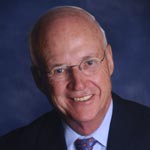
James VanHorne received his B.A. from DePauw University in 1957, and his MBA and Ph.D. degrees from Northwestern University in 1961 and 1964, respectively. He also received a DSci (Hon.) in 1986. He is currently the A.P. Giannini Professor of Finance, Emeritus at Stanford University, having started his academic career at Stanford in 1965. Many of Dr. VanHorne’s colleagues, friends, and former students have taken it upon themselves to establish an endowed chair in his honor, the James C. Van Horne Professorship in the Stanford Graduate School of Business.
Professor VanHorne’s areas of research include theory and behavior of interest rates, capital budgeting decisions, corporate finance, valuation, the term structure of interest rates, effect of inflation, and finance innovation. He has authored roughly 60 articles in finance, economic, and management journals. He is the author of five books. Three of these books – Financial Management and Policy, 12th edition; Financial Market Rates and Flows, 6th edition; and Fundamentals of Financial Management, 12th edition, (coauthor); have been widely used as textbooks in the United States and abroad. In addition, he has written 24 cases that have been used in MBA courses in the school.
In the mid-1970s, Dr. VanHorne served as Deputy Assistant Secretary of the United States Treasury, and worked with several Federal and State of California commissions and advisory groups. Dr. VanHorne served on many corporate and nonprofit boards as well. He was the first recipient of the distinguished teaching award by MBA students, and was awarded the honor again in 1997. At Stanford, he has served as director of the MBA program and as an associate dean for academic affairs. In 1989, he received the Robert T. Davis Award by the dean for extraordinary faculty contributions over his lifetime.
Dr. VanHorne is a former president of the Western Finance Association. Additional position that Dr. VanHorne has held include active membership of the Financial Economists Roundtable; associate editor of several leading finance journals and author of many books; Deputy Assistant Secretary, United States Treasury, 1975-76; assistant professor at Michigan State University, 1964-65; and a commercial lending representative at Continental Illinois National Bank and Trust Co. of Chicago, 1958-62.
Sources of information for James C. Van Horne
http://www.gsb.stanford.edu/giving/news/vanhorneprofessorship.html
http://www.gsb.stanford.edu/users/jhorne
http://en.wikipedia.org/wiki/American_Finance_Association
Photograph from the Stanford Graduate School of Business website

Stewart Myers received his A.B. from Williams College on 1962, his MBA from Stanford University in 1964, and his Ph.D. from Stanford University in 1967. He also received the following honors throughout his career: Doctor Honoris Causa, Free University of Brussels, 1997; D. Sc., Honorary, London Business School and University of London, 2000; and D. Sc., Honoris Causa, University of Lancaster, 2012.
Professor Myers is currently the Robert C. Merton Professor of Financial Economics at the Massachusetts Institute of Technology’s Sloan School of Management. His primary teaching responsibility at MIT is in the area of finance theory and corporate financial management. Professor Myers was also faculty head of MIT’s Financial Engineering Track from 1999-2003.
Dr. Myer’s research focus is on the valuation of real and financial assets, corporate financial policy, and the financial aspects of government regulation of business. He has authored dozens of research papers. He is the author of influential research papers on many topics, including adjusted present value, rate of return regulation, pricing and capital allocation in insurance, real options, and moral hazard and information issues in capital structure decisions. Recent research projects have include the valuation of investments in research and development, risk management, the allocation of capital in diversified firms, and the theory of corporate governance. Dr. Myer is also known for coining the term “real option.”
Dr. Myers is the co-author of the classic textbook, Principles of Corporate Finance, which is now in its 11th edition. He is a principal of The Brattle Group, Inc. and a director of Entergy Corporation. He is a an elected fellow of the Financial Management Association, a research associate of the National Bureau of Economic Research, and a director of the Cambridge Endowment for Research in Finance.
Sources of information for Stewart C. Myers
http://mitsloan.mit.edu/faculty/detail.php?in_spseqno=SP000093&co_list=F
“Stewart Myers Profile.” Marquis Who’s Who. N.p., 2010. Web. 30 July 2010.
Stewart C. Myers CV
http://en.wikipedia.org/wiki/Stewart_Myers
http://en.wikipedia.org/wiki/American_Finance_Association
Photograph from the MIT Sloan Faculty Directory

Harry Markowitz was drawn to physics and philosophy during his high school years, and his interests continued to peak during his undergraduate years at the University of Chicago. After receiving his B.A., he continued his graduate studies at the U of C, choosing to specialize in economics. He later had the opportunity to study under well known economists such as Milton Friedman, Tjalling Koopmans, Jacob Marschak and Leonard Savage. While still a graduate student, he became a member of the Cowles Commission. In 1955, he received a Ph.D. from the University of Chicago in applying mathematics.
In 1952, his seminal theory of portfolio allocation under uncertainty was published by the Journal of Finance. That same year, Professor Markowitz was hired by the RAND Corporation. With George Dantzig’s help, Dr. Markowitz started to research optimization techniques, developing the critical line algorithm for the identifications of the optimal mean-variance portfolios, relying on what was later named the Markowitz frontier. In 1955, Dr. Markowitz spent a year at the Cowles Foundation at Yale University and published the critical line algorithm in a 1956 paper. He later wrote a book on portfolio allocation which was published in 1959.
In 1989, Dr. Markowitz was awarded the Von Neumann Prize in Operations Research Theory by the Operations Research Society of America and The Institute of Management Sciences. They cited his works in the areas of portfolio theory, sparse matrix techniques, and the SIMSCRIPT programming language. Dr. Markowitz co-founded, with Herb Karr, CACI International, to provide support and training for SIMSCRIPT.
Dr. Markowitz won the Nobel Prize in Economics in 1990, while he was a professor of finance at Baruch College of the City University of New York. He had put forth theories for assessing the risk involved in the stock markets and the returns on corporate bonds and stocks, known as the Modern Portfolio Theory. This Nobel winning economist is presently employed at the Rady School of Management at the University of California, San Diego.
Sources of information for Harry M. Markowitz
http://rady.ucsd.edu/faculty/directory/markowitz/
http://en.wikipedia.org/wiki/Harry_Markowitz
http://nobelprize.org/nobel_prizes/economics/laureates/1990/markowitz-autobio.html
http://www.britannica.com/EBchecked/topic/365811/Harry-M-Markowitz
http://www.economywatch.com/economist/harry-m-markowitz.html
http://special.lib.umn.edu/cbi/oh/pdf.phtml?id=297
http://ideas.repec.org/e/pma73.html
http://en.wikipedia.org/wiki/American_Finance_Association
Interview with Jeffrey R. Yost on March 18, 2002
Photograph from the University of California Nobel Laureates website
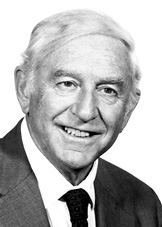
Franco Modigliani (1918-2003) left his country of origin, Italy, in 1939 and obtained his Ph.D. from the New School of Social Research in 1944. After receiving his doctorate, Professor Modigliani taught at the New School until 1949, and then worked as a research consultant to the Cowles Commission at the University of Chicago from 1949 to 1952. Other universities where he held professorships included Carnegie Institute of Technology (1952 to 1960), Northwestern University (1960 to 1962), and the Massachusetts Institute of Technology (1962 until his death).
In 1985, Dr. Modigliani received the Nobel Prize for two contributions. The first contribution was for “his analysis of the behavior of household savers.” In the early 1950s, Dr. Modigliani, trying to improve on Keynes’s consumption function, introduced his “life cycle” model of consumption. Most people, he posited, want to have a stable level of consumption. Therefore, he maintained that individuals save in high-income years and spend more than their income in low-income years. The typical trajectory is that income is low for young adults who are just starting out, then there are increases in the middle years, and then declines in retirement. Therefore, younger people borrow to spend more than their income, middle-aged people save a lot, and older people run down their savings.
The second contribution that helped Dr. Modigliani to win the Nobel Prize is the widely known Modigliani-Miller theorem in corporate finance. Professor Modigliani, together with Merton Miller, showed that under certain assumptions, the value of a firm is independent of its ratio of debt-to-equity.
Dr. Modigliani co-wrote two articles with Dr. Miller, and their insight was a cornerstone in the field of corporate finance. Dr. Modigliani also wrote one of the articles that started the rational expectations school of economics. In a 1954 article, he and co-author Emile Grumburg stipulated that individuals may anticipate certain government policies and act accordingly. Dr. Modigliani objected, though, to the lengths to which the rational expectations school has taken this basic insight. An additional noteworthy accolade includes serving as president of the American Economic Association.
Sources of information for Franco Modigliani
http://en.wikipedia.org/wiki/Franco_Modigliani
http://www.econlib.org/library/Enc/bios/Modigliani.html
http://en.wikipedia.org/wiki/American_Finance_Association
Photograph from the Nobelprize website
William Forsythe Sharpe (1980)
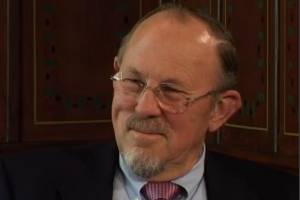
William Sharpe received his B.A., M.A., and Ph.D. in economics from the University of California at Los Angeles, in 1955, 1956, 1961, respectively. While completing his doctoral work, he had also conducted research at the RAND Corporation. Professor Sharpe was the recipient of the Doctor of Humane Letters, Honoris Causa from DePaul University; the Doctor Honoris Causa from the University of Alicante (Spain); the Doctor Honoris Causa from the University of Vienna (Austria); and the Doctor of Science, Economics, Honoris Causa from the London Business School and the UCLA Medal (the University of California Los Angeles’s highest honor).
Dr. Sharpe was the first STANCO 25 Professor of Finance and Emeritus at Stanford University’s Graduate School of Business. He joined the faculty there in 1970, having previously taught at the University of Washington and the University of California at Irvine. During this time, he also served as a consultant to Merrill Lynch and Wells Fargo.
Professor Sharpe’s research interests focus on macro-investment analysis and equilibrium in capital markets. He has published articles in a number of professional journals, including the Journal of Business, Journal of Finance, Journal of Financial Economics, Journal of Financial and Quantitative Analysis, Journal of Portfolio Management, Management Science, and the Financial Analysts’ Journal. He has also written seven books, including Portfolio Theory and Capital Markets; Asset Allocation Tools; Fundamentals of Investments; Investments; and Investors and Markets: Portfolio Choices, Asset Prices and Investment Advice.
In 1990, Dr. Sharpe received the Nobel Prize in economic sciences for developing a general theory for the pricing of financial assets. He was one of the originators of the Capital Asset Pricing Model. He is credited for developing the Sharpe Ratio for investment performance analysis, the binomial method for the valuation of options, the gradient method for asset allocation optimization, and returns-based style analysis for evaluating the style and performance of investment funds. Following Dr. Sharpe’s retirement in 1989, he established William F. Sharpe Associates, an investment consulting firm. He later co-founded Financial Engines, a portfolio advising company, in 1996.
Sources of information for William F. Sharpe
http://www.stanford.edu/~wfsharpe/
http://en.wikipedia.org/wiki/William_Forsyth_Sharpe
http://www.nndb.com/people/204/000159724/
http://en.wikipedia.org/wiki/American_Finance_Association
Photograph from the ETF Strategy website
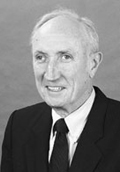
Edward Kane received his undergraduate degree from Georgetown University in 1957 and a doctoral degree from the Massachusetts Institute of Technology in 1960. From 1972 to 1992, he held the Everett D. Reese Chair of Banking and Monetary Economics at the Ohio State University.
Dr. Kane is currently a Professor of Finance at Boston College’s Carroll School of Management. His areas of research include financial crisis, deposit insurance, causes and implications of financial change, the changing structure of financial services competition and regulation, politics of policymaking, and taxation of financial institutions and instruments. In addition to authoring three books, he has published in many professional journals and currently serves on six editorial boards.
Additional accolades for Professor Kane include a former Guggenheim fellow, and former president of the International Atlantic Economic Society and the North American Economics and Finance Association. Dr. Kane has won many awards, including the Inaugural Lifetime Achievement Award from the Midwest Financial Association, and the Shared Adam Smith Award given by the National Association of Business Economics in 2002.
Dr. Kane is a longtime research associate of the National Bureau of Economic Research. He is also a consultant for the World Bank and is a senior fellow in the Federal Deposit Insurance Corporation’s Center for Financial Research. Previously, he has consulted for numerous agencies, including the International Monetary Fund, components of the Federal Reserve System, and foreign central banks. He has also served as a consultant to the Congressional Budget Office, the Joint Economic Committee, and the Office of Technology Assessment of the United States Congress. In 2005, he rejoined the Shadow Financial Regulatory Committee, after initially having been a founding member. He served for 12 years as a trustee and member of the finance committee of Teachers Insurance.
Sources of information for Edward J. Kane
https://www2.bc.edu/edward-kane/KaneBio.pdf
http://www.bc.edu/schools/csom/faculty/bios/kane.html
http://nabe.com/publib/asmith
http://www.nber.org/reporter/2014number1/news.html
http://en.wikipedia.org/wiki/American_Finance_Association
Photograph from the Boston College Carroll School of Management website

Burton Malkiel received his B.A. in economics from Harvard University in 1953, an M.A. in business administration from the Harvard Graduate School of Business Administration in 1955, and a doctorate in economics and finance from Princeton University. He served as a first lieutenant in the United States Army Finance Corps from 1955 to 1958, prior to earning his doctoral degree in 1964.
Dr. Malkiel was the Gordon S. Rentschler Professor of Economics and Director of the Financial Research Center at Princeton University. He is currently the Chemical Bank Chairman’s Professor of Economics, Emeritus, and a senior economist at Princeton University. From 1981-1998, he was dean at the School of Management and the William S. Beinecke Professor of Management at Yale University.
Professor Malkiel has been widely published in finance, specifically in the areas of the valuation of stocks and bonds and the operation of financial markets in the United States. His areas of expertise include financial markets, portfolio management, corporate finance, investments and securities valuation. Dr. Malkiel has written numerous influential articles, including “The Valuation of Closed-End Investment Company Shares,” which was published in 1977 in the Journal of Finance. This article discussed the conundrum of why closed-end funded companies typically trade at market valuations lower than the net value of their assets. He has written several books and is especially well known for his classic finance book A Random Walk Down Wall Street.
Dr. Malkiel has held many administrative positions in the latter part of his career. He also served as a member of the Council of Economic Advisors, from 1975-1977, under the administration of United States President Gerald R. Ford. He spent 28 years as a director of the Vanguard Group. Dr. Malkiel currently serves as Chief Investment Office to software-based financial advisor Wealthfront, Inc., and also serves on the advisory panel of the investment firm Research Affiliates.
Sources of information for Burton G. Malkiel
http://en.wikipedia.org/wiki/Burton_Malkiel
http://www.rebalance-ira.com/burt-malkiel/
http://en.wikipedia.org/wiki/American_Finance_Association
Photograph from the Genmab website
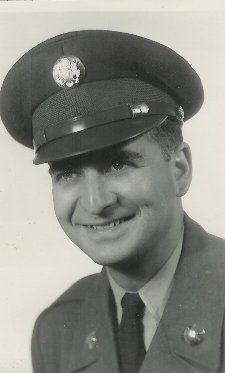
Alexander Robichek (1925-1978) arrived to the United States after World War I, and then entered the Military Intelligence Service of the United States Army. He later attended the University of California at Berkeley, receiving his undergraduate degree in 1956. After graduating, he accepted a position as a staff accountant with Haskins and Sells and obtained his CPA certificate in 1958. In 1962, he re-entered the University of California to obtain his doctorate.
In 1960, Professor Robichek joined the finance faculty of the Graduate School of Business at Standford University. He remained on the Stanford faculty for his entire academic career, except for two visiting professorships at other institutions. He spent one year at the IMEDE Institute in Lausanne, Switzerland, and a semester at the University of British Columbia. Dr. Robichek’s interest and prominence in management education afforded him the opportunity to travel to places such as Europe, Australia, Asia and Latin America. He was also fluent in five languages, which likely assisted him in his travels.
His employment history at the Stanford University Graduate School of Business includes serving as director of the doctoral program, the Stanford Executive Program, and the Financial Management Program. Dr. Robichek was an active researcher as well as the author and co-author of many articles and books. He created a substantial amount of original and widely-used teaching materials. His teaching interests included business finance, management of financial institutions, and international finance. At Stanford, he also taught courses in money and capital markets and accounting.
Dr. Robichek was active in several professional societies as well. He served as the editor of the Journal of Finance. He also had close ties to the business community and served as a director and consultant to several corporations. Even decades after his premature passing, the Stanford University Graduate School of Business continues to recognize his accomplishments by presenting the Alexander Robichek Award, recognizing achievement in finance courses.
Sources of information for Alexander A. Robichek
http://historicalsociety.stanford.edu/pdfmem/RobichekA.pdf
http://www.robichek.com/alexander.htm
http://en.wikipedia.org/wiki/American_Finance_Association
Photograph from Alexander Robicheck website

Merton Miller (1923-2000) worked as an economist during World War II in the Division of Tax Research of the Treasury Department, and received a Ph.D. in economics from Johns Hopkins University in 1952. His first academic appointment, after receiving his doctorate, was as a visiting assistant lecturer at the London School of Economics. Dr. Miller spent most of his academic career at the University of Chicago’s Booth School of Business, serving as a faculty member from 1961-1993, where he was the Robert R. McCormick Distinguished Service Professor. After his retirement in 1993, he continued teaching at the school for several more years.
Dr. Miller wrote or co-authored eight books. His research interests included the economic and regulatory problems of the financial services industry, especially with regard to securities and options exchanges. Throughout his life, Dr. Miller was an active supporter of free market solutions to economic problems.
In 1958, at the Carnegie Institute of Technology, he collaborated with Franco Modigliani on the paper “The Cost of Capital, Corporate Finance and the Theory of Investment.” This paper objected to the traditional view of corporate finance, in which a corporation can reduce its cost of capital by finding the right debt-to-equity ratio. His works formed the basis of the Modigliani-Miller Financial Theory, which proposed the irrelevance of debt-equity structure. Dr. Miller continued to collaborate with Dr. Modigliani on corporate finance papers through the mid 1960s. In 1990, He shared the Nobel Memorial Prize in Economic Sciences with Harry Markowitz and William Sharpe.
Dr. Miller served in several administrative positions later in his career. He became a fellow of the Econometric Society in 1975. He also served as a public director on the Chicago Board of Trade from 1983-1985, and the Chicago Mercantile Exchange from 1990 until his death.
Sources of information for Merton H. Miller
http://en.wikipedia.org/wiki/Merton_Miller
http://www.nobelprize.org/nobel_prizes/economic-sciences/laureates/1990/miller-bio.html
http://en.wikipedia.org/wiki/American_Finance_Association
Photograph from the Nobel prize website
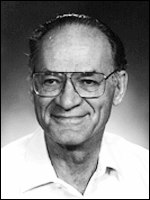
Myron Gordon (1920-2010) received a B.A. from the University of Wisconsin in 1941. After serving in the United States Army as a 2nd lieutenant during World War II, he returned to study economics at Harvard University, where he received an M.A. in 1947 and then a Ph.D. in 1952.
Beginning in 1947, Dr. Gordon worked as an assistant professor at Carnegie-Mellon University until 1952. He then became an associate professor at Massachusetts Institute of Technology (1952-62), a professor at the University of Rochester (1962-70), and a professor at the University of Toronto Rotman School of Management (1970-85), later receiving emeritus status there.
Professor Gordon’s research contributions were extensive. He was the author of several books and more than 100 articles. Dr. Gordon’s interests included the following topics: the cost of capital and valuation of corporations, comparison of market and regulation in control utility companies, China’s economic development, and growth and security under welfare capitalism and market socialism. His reputation preceding him, Dr. Gordon’s name is instantly recognized by students and practitioners in finance through the Gordon Growth Model. His model is still used today in the valuation of common stocks.
Dr. Gordon has served as an associate editor for several academic journals, including the Journal of Finance, Financial Management, Journal of Banking and Finance, and the Journal of Economics and Business. He also was a fellow of the Royal Society of Canada.
Dr. Gordon received many significant honors for his work, including an Honorary Doctor of Law from McMaster University (1993) and an Honorary Doctorate from the University of Toronto (2005). The most important honor bestowned upon him was from the conference “Imperfections in Financial Markets and their Impact on Corporate Financial Decisions,” held in 1989 in honor of his retirement. Following his retirement, he remained active in research by publishing for the next twenty years.
Sources of information for Myron J. Gordon
Information for obituary was provided by Larry Gould on August 10, 2010
http://www.rotman.utoronto.ca/~gordon/
http://www.legacy.com/obituaries/thestar/obituary.aspx?n=myron-j-gordon&pid=144068310
http://en.wikipedia.org/wiki/American_Finance_Association
Photograph from Sargon Y. Zia website
John Virgil Lintner, Jr. (1974)
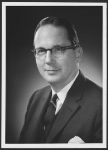
John Lintner, Jr. (1916-1983) received an A.B. in 1939 and an M.A. in 1940, both from the University of Kansas. In 1942, he received another M.A., and then his Ph.D. in 1946, both from Harvard University. In 1942, he became a member of the Society of Fellows, which is a three-year paid fellowship with self-directed research.
Professor Lintner taught economics at the University of Kansas from 1939-1940 and at Harvard Business School from 1946-1983. He became Harvard’s first George Gund Professor of Business and Economics in 1961. Dr. Lintner was a director of the university’s joint Ph.D. program in Economics and Business for 15 years and had agreed to resume the chairmanship of the program as well. He was the author of many research papers and four books, including his popular text Mutual Savings Banks in Savings and Mortgage.
Dr. Lintner was widely known in the financial and academic communities for his major contribution to the capital asset pricing model, of which he was a co-creator, which is a method of estimating the future value of an investment. This prominent model, developed in the 1950s and 1960s, has become the basis for modern portfolio theory. It allows investors to factor in certain elements of risk into their calculations. Throughout his career, Dr. Lintner attempted to broaden the application of this capital market theory. His final publication had analyzed the effectiveness of the capital asset pricing model fit to the real world.
As a part of his career trajectory, Dr. Lintner had been a consultant to the United States Treasury Department for both Democratic and Republican administrations, the Council of Economic Advisors, and the Federal Home Loan Bank Board. He was also a member of the board of trustees at Cambridge Savings Bank, and served on the board of director for both the United States Foreign Securities Corp and Chase of Boston Mutual Funds.
In 1983, Dr. Lintner suffered a fatal heart attack while driving. Some contend that had he lived until 1990, he would have shared the Nobel Prize in Economics that year for portfolio theory.
Sources of information for John V. Lintner
http://www.thecrimson.com/article/1983/6/26/prominent-harvard-economis-dies-in-automobile/
http://www.nytimes.com/1983/06/10/obituaries/john-v-lintner-jr-67-dies-harvard-business-professor.html
http://en.wikipedia.org/wiki/John_Lintner
http://en.wikipedia.org/wiki/American_Finance_Association
Article from the Boston Globe October 17, 1990
Photograph provided by the Harvard University Archives
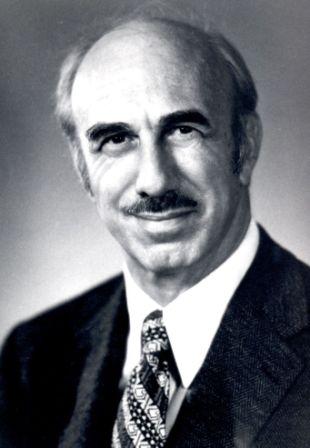
Sherman Maisel (1918-2010) completed his undergraduate work from Harvard University in 1939. He then continued his studies there to obtain two master’s degrees there in 1947 and 1948 and a Ph.D. in 1949. From 1939 to 1941, he had secured a position as a research economist at the Federal Reserve Board in Washington. Then in 1941, he served in the United States Army from 1941 to 1945, rising from private to captain and working at air bases and ordinance depots. He also served one year in the Foreign Service, based in Brussels.
Professor Maisel spent the majority of his academic career at the University of California-Berkeley Haas School of Business, where he was professor emeritus. He taught there from 1948 to 1965, and again from 1972 until his retirement in 1986. Dr. Maisel’s areas of experience included monetary and fiscal policy, financial institutions, and mortgage and securities markets. In addition to writing several books, Dr. Maisel had over 120 published articles, reviews, and testimony. It has been said that his work on housing cycles and mortgage markets was path-breaking.
From 1982 to 1985, Dr. Maisel served as chairman and a member of the board of directors for the Farmers Savings and Loan Association and FSB Inc. Previously, he was part of the senior research staff and principal investigator for the National Bureau of Economic Research. In 1965, he was appointed governor of the Federal Reserve, whose research on housing markets shaped decades of federal policy on mortgages. Dr. Maisel found that the structure of the mortgage market tended to suppress home construction during economic crises, and that the government could help to buffer the economy by offering a secondary mortgage market. Dr. Maisel was also a member of the American Economic Association.
Sources of information for Sherman J. Maisel
“Sherman Maisel Profile.” Marquis Who’s Who. N.p., 2010. Web. 30 July 2010.
https://libserv7.princeton.edu:82/pul/nph-pul2.cgi/000000A/http/
http://www.nytimes.com/2010/10/07/business/07maisel.html?_r=0
http://en.wikipedia.org/wiki/Sherman_J._Maisel
http://www.federalreservehistory.org/People/DetailView/99
http://en.wikipedia.org/wiki/American_Finance_Association
Photograph provided by Blackwell Publishing for the American Finance Association
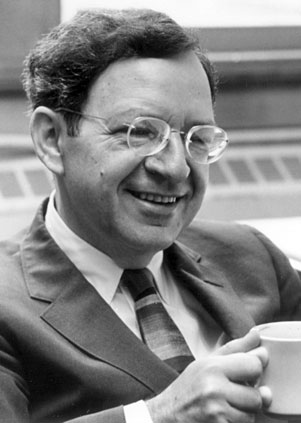
Irwin Friend (1915-1987) received a bachelor’s degree from City College of New York and a doctorate degree from American University. Prior to his work in academia, Dr. Friend was hired by the United States Securities and Exchange Commission in 1937, where served as assistant director of trading and exchange. In 1947, Dr. Friend was appointed chief of the Business Structure Division for the United States Department of Commerce.
In 1953, Dr. Friend joined the faculty of the Wharton School at the University of Pennsylvania, and he was designated as the Edward J. Hopkinson Professor of Finance and Economics in 1978. Dr. Friend also served as director of the Rodney L. White Center for Financial Research at Wharton, and he was granted emeritus status when he retired.
Professor Friend’s path-breaking research of emerging financial institutions brought new influence to Wharton’s Finance Department as well as industry-wide reforms. Dr. Friend examined the OTC market for corporate equity, the savings and loan industry, the mutual fund industry, the investment banking industry, scholarship that was used by congressional committees, federal and state regulatory agencies, academics, and securities organizations.
Dr. Friend was also among the first to question the commonly held view that mutual funds perform better than an unmanaged portfolio of individual stocks. His work in the early 1950s was among the first to use of comprehensive data on the structure of the OTC market and provided estimates of the number of participants, the volume and size of transactions, the variability of bid-ask spreads, and the relative importance of the market with respect to the distribution of new stock issues by small firms. His 1962 book, A Study of Mutual Funds, anticipated much of the later theory and empirical work on the efficient market hypothesis. The study was prepared for the Securities and Exchange Commission and is widely viewed as a precursor for the rise in index funds and various other industry reforms.
Dr. Friend served as a director and trustee for Witter/Sears Intercapital Funds & Trusts. He established graduate programs in China and Portugal. He served as a consultant for the United States Treasury, the Justice Department, the United States Bureau of the Budget, the Agency for International Development, the National Council for Applied Economic Research, and the American Telephone & Telegraph Company. Dr. Friend also served on editorial boards for the American Economic Review, the Journal of Finance, and the Journal of Banking and Finance.
Sources of information for Irwin Friend
http://www.wharton.upenn.edu/125anniversaryissue/friend.html
http://articles.philly.com/1987-08-18/news/26167230_1_consultant-american-finance-association-china-and-portugal
http://en.wikipedia.org/wiki/American_Finance_Association
Photograph from the Wharton School of the University of Pennsylvania website
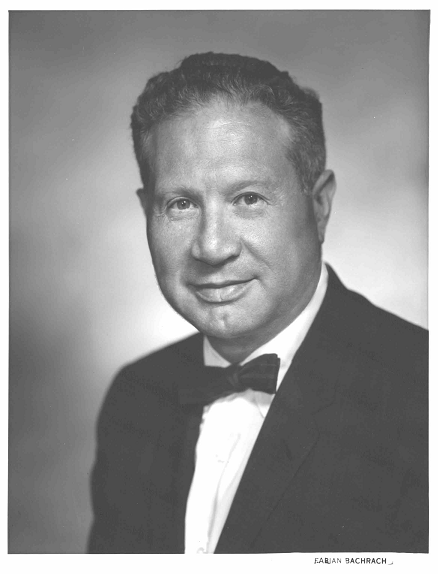
Joseph Pechman (1918-1989) attended City College prior to commencing graduate work at the University of Wisconsin, where he received his Ph.D. in 1942. In 1978, he received an honorary doctorate degree of law. After serving as a meteorologist in the army during World War II, Dr. Pechman began his civilian career at the United States Treasury Department.
While Washington D.C. remained his professional home, he frequently returned to the academic world for a semester or two of teaching. He has taught at numerous schools throughout his career, including George University Law Center, Yale University, Stanford University, Dartmouth College, Williams College, Massachusetts Institute of Technology, and the London School of Economics.
Dr. Pechman was a leading scholar of tax policy and the director of economic studies at the Brookings Institution for more than 20 years. As the director, he endorsed the Brookings Panel on Economic Activity. He had also served on the staff of the Council of Economic Advisers and then on the Committee for Economic Development prior to joining the Brookings Institute.
Professor Pechman was the author of half a dozen books on the United States Tax Code and served as an editor for more than twenty. In addition, he published numerous professional articles, testified before Congress, and contributed frequently to newspapers’ opinion pages. Dr. Pechman’s book, Federal Tax Policy, is the standard reference work on the United States tax system. He was a lifelong proponent of progressive taxation, which was congruent with his views on income distribution and concerns of those who are less well off financially. As the ‘Intellectual Father’ of Tax Law, as he was known to many, he was the leading scholar in the Tax Reform Act of 1986.
Dr. Pechman made many other notable contributions during his career. He was a fellow of the American Academy of Arts and Sciences. Dr. Pechman was a senior fellow emeritus at Brookings and president of the American Economic Association at the time of his death. He was also planning a conference to compare tax systems around the world just prior to his death. An additional noteworthy accomplishment was his mentorship of younger staff members and students throughout this career.
Sources of information for Joseph A. Pechman
http://www.brookings.edu/~/media/Projects/BPEA/1989%202/1989b_bpea_perry.PDF
http://www.nytimes.com/1989/08/21/obituaries/joseph-a-pechman-is-dead-at-71-aided-1986-income-tax-changes.html
http://www.aeaweb.org/articles.php?doi=10.1257/jep.4.4.121
http://en.wikipedia.org/wiki/American_Finance_Association
Additional biographical information provided by the Brookings Institute
Photograph provided by the Brookings Institute
Lawrence Stanley Ritter (1970)
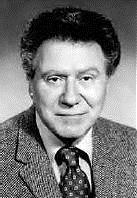
Lawrence Ritter (1922-2004) received his undergraduate degree at Indiana University, and later completed a doctorate from the University of Wisconsin. Dr. Ritter was a professor of economics and finance, and later chairman of the Department of Finance at the Graduate School of Business Administration at New York University. He remained on staff at NYU for more than 30 years, where there is currently a research room and an endowed chair in his name. His book, Principles of Money, Banking, and Financial Markets, co-authored with William L. Silber and Gregory F. Udell, has been a standard college text since it was first published in 1974. The book is now in its 11th edition. Dr. Ritter also edited the Journal of Finance from 1964 to 1966.
In addition to his academic accomplishments at NYU, Dr. Ritter was also well known for his work as a journalist and an author. His interviews allowed participants to reminisce without interruption, as he rarely prodded them on any particular matter. He was able to elicit information from interviewees that other reporters were often unable able to reach with questions.
In 1966, Dr. Ritter wrote one of the most famous sports books of all time, The Glory of Their Times (updated in 1984). Over a four year span, he had collected oral histories from 22 baseball players. He collaborated with another baseball historian, Donald Honig, to write The Image of Their Greatness (1979) and The 100 Greatest Baseball Players of All Time (1981); featuring several players who would later be dropped in favor of new players on several later all-time greats lists. Dr. Ritter also wrote Lost Ballparks; The Babe: A Life in Pictures (with Mark Rucker); The Story of Baseball; East Side, West Side: Tales of New York Sporting Life; and Leagues Apart: The Men and Times of the Negro Baseball Leagues.
Sources of information for Lawrence S. Ritter
http://en.wikipedia.org/wiki/Lawrence_Ritter
http://usatoday30.usatoday.com/sports/baseball/2004-02-15-ritter-obituary_x.htm
http://www.nytimes.com/2004/02/17/sports/lawrence-s-ritter-chronicler-of-baseball-history-dies-at-81.html
http://en.wikipedia.org/wiki/American_Finance_Association
Photograph from Library Thing website

Walter Hoadley (1916-2003) received his A.B. in 1938, his M.A. in 1940 and his Ph.D. in 1946, all from the University of California at Berkeley. While completing his doctorate, Dr. Hoadley had spent part of 1941-1942 serving as a supervisor of the industrial management war training office.
From 1942-1949, Dr. Hoadley worked as a senior economist at the Federal Reserve Bank of Chicago. Then in 1949, he joined Armstrong World Industries, also as an economist. In 1954, he became their treasurer. He also became their vice president in 1960 and continued to conserve in this capacity (still as treasurer also) until 1966. After leaving Armstrong, Dr. Hoadley joined Bank of America NT&SA in San Francisco. There he served as senior vice president, chief economist, and a member of the managing committee. He later became executive vice president and continued to serve as chief economist until his retirement in 1981. Following his retirement from Bank of America, he accepted a position as a senior research fellow at Stanford’s Hoover Institute.
Dr. Hoadley was highly active in professional and civic activities. He served as fellow of the American Statistical Association, vice president and member on the board of directors, and then president in 1958. He also was a member and chairman of the Conference of Business Economists, as well as one of the board of directors of the National Bureau of Economic Research (member of economic advisory council, 1976-1978).
As an early member of the National Association for Business Economics, Dr. Hoadley was elected a fellow in the San Francisco chapter, where he served on the executive committee. He made a significant contribution to NABE through two conferences that he organized and chaired in 1986 and 1988, while he was at the Hoover Institution. The Hoover Institution sponsored the conferences and distributed the proceedings, with summaries written by Dr. Hoadley, as special editions of Business Economics in February 1987 and February 1989.
Dr. Hoadley’s 1988 book, Looking Behind the Crystal Ball: How to Use a Business Economist Successfully, was a major contribution to business economics. He advocated the importance of improving adult economic and a great urgency to strengthen economic comprehension among youth. He gave freely of his time and knowledge to younger members in the profession. Dr. Hoadley always stressed the importance of international developments and diversity, drawing on his experiences through extensive travel abroad and his friendships with economists worldwide.
Sources of information for Walter E. Hoadley
http://www.thefreelibrary.com/In+memoriam.-a0102662128
Walter E(vans) Hoadley. Contemporary Authors Online. Detroit: Gale, 2002. Gale Biography In Context. Web. 15 Feb. 2012.
http://www.sfgate.com/news/article/HOADLEY-Walter-Evans-2629054.php
http://en.wikipedia.org/wiki/American_Finance_Association
Photograph from the National Association of Business Economics website
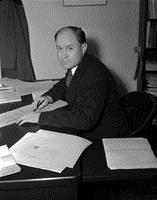
Harry Sauvain (1907-1996) began his undergraduate education at Ball State University, and then transferred to New York University, where he received his bachelor’s, master’s, and doctoral degrees. He accepted an instructor position in 1931 while completing his Ph.D. Then in 1936, he accepted a position at Indiana University as an associate professor of finance and director of the Investment Research Bureau. Two years later he achieved full professorship. From 1942-1943, Dr. Sauvain served as acting dean at IU. At one point he enlisted in the military during World War II, earning four battle stars and a captain’s commission.
Professor Sauvain was considered to be one of the nation’s leading authorities in finance. He was the author of America’s Experience as a Creditor Nation and Investments Management. He served as editor for two IU business school publications, Investment Bulletin and Seminar Bulletin.
Dr Sauvain played an integral role in the expansion of the business school after the war. For example, the MBA program was reorganized and doctoral efforts were launched under his leadership. He chaired the finance department from 1940-1961. From 1959-1960, he served as a visiting professor at Stanford University, and the following year was named the first Charles W. Gerstenberg Professor of Finance at NYU. A teaching award was established in his name in 1967 through a gift by a former student.
Dr. Sauvain was an Indiana University business professor emeritus who helped to establish the College Retirement Equities Fund (CREF). He was involved as a trustee of CREF and the Teachers Insurance and Annuity Association of America. He also founded the IU Annuitants Association.
Additional positions that Dr. Sauvain had held included secretary of the Indiana Commission for Financial Institutions and director of the First National Bank of Bloomington (later Bank One of Bloomington). He was also a member of the Ministers and Missionaries Benefit Board of the American Baptist Convention and the First Baptist/United Church of Christ. At one point, Dr. Sauvain received a distinguished service award in investment education from the National Association of Investment Clubs.
Sources of information for Harry C. Sauvain
http://www.jstor.org/stable/2976481?seq=2
http://ideas.repec.org/cgi-bin/htsearch?q=Harry+C.+Sauvain&cmd=Search%21
http://www.worldcat.org/search?q=Harry+C+Sauvain&qt=results_page
http://en.wikipedia.org/wiki/American_Finance_Association
http://www.jstor.org.proxy.library.nd.edu/stable/2325795?seq=17
http://scholar.google.com.proxy.library.nd.edu/scholar?ie=utf-8&q=%22author:Harry%20Sauvain%22
Additional biographical information provided by the Office of Archives and Records Management at Indiana University Bloomington
Photograph provided by the Office of Archives and Records Management at Indiana University Bloomington
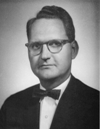
Robert Roosa (1918-1993) began his studies at the University of Michigan, receiving his A.B. in 1939. He received a Rhodes Scholarship for graduate school, but due to the outbreak of war in Europe, did not use it to attend Oxford University. Instead, he continued his education at Michigan, and obtained his M.A. and Ph.D. degrees in 1940 and 1942, respectively. From 1939 and 1943, he taught economics at the University of Michigan, Harvard University, and the Massachusetts Institute of Technology. During World War II, he worked in London as an assistant to Charles P. Kindleberger in the Enemy Objectives Unit, identifying enemy targets.
In addition to his work in academics, Dr. Roosa also worked as an economist and banker. In 1946, he was hired by the Federal Reserve Bank of New York, eventually to become the vice president in the bank’s research department. He later became Treasury Undersecretary for Monetary Affairs, under John F. Kennedy, where he helped to address the balance of payments problem facing America at that time. One of his ideas included the creation of bonds that would attract and allow foreign holders of dollars to turn them into long-term assets as an alternative to buying United States gold. These Roosa bonds were bought with dollars, but were denominated and repaid in Swiss francs. Dr. Roosa believed that the international monetary system should be based on a reference – the United States dollar. He maintained that the U.S. dollar should be the world’s leading currency and reference point because the United States was the leading political and economic power. He continued his work for Monetary Affairs under the administration of Lyndon B. Johnson until 1964. He co-authored, with Milton Freedman, The Balance of Payments: Free Versus Fixed Exchange Rates, American Enterprise Institute for Public Policy Research, Washington, D.C. (1967).
Dr. Roosa held numerous additional administrative positions later in his career. He was a director at the Council on Foreign Relations between 1966 and 1981, as well as a trustee of the Rockefeller Foundation. In 1979, Dr. Roosa became a member of the influential Washington-based financial advisory body, the Group of Thirty. He was also a member of the Trilateral Commission. From 1975 to 1986, he was chairman of the Brookings Institution. In 1965, Dr. Roosa joined the Wall Street firm of Brown Brothers Harriman as a partner, and retired from there in 1991.
Sources of information for Robert V. Roosa
http://www.nytimes.com/1993/12/25/obituaries/robert-v-roosa-is-dead-at-75-served-as-us-treasury-official.html?pagewanted=1&pagewanted=print
http://books.google.com/books?id=v0oLAAAAIAAJ&pg=PA225&dq=proceedings+american+philosophical+society+Robert+Roosa&hl=en&sa=X&ei=6ZFeU8XLDuPM2AW1xIDYAQ&ved=0CC0Q6AEwAA#v=onepage&q=proceedings%20american%20philosophical%20society%20Robert%20Roosa&f=false
http://en.wikipedia.org/wiki/Robert_Roosa
http://en.wikipedia.org/wiki/American_Finance_Association
Photograph from the University of Michigan Economics website

J. Fred Weston (1916-2009) earned his B.A. in political science in 1937, his MBA in 1943, and his Ph.D. in financial economics in 1948 – all from The University of Chicago. After serving in the army in its finance department, he briefly taught at the U of C prior to joining the University of California Los Angeles faculty in 1949. In 1956, he was promoted to full professor and remained there until his retirement in 1986. He eventually received the title of Professor Emeritus Recalled of Managerial Economics and Finance at the John E. Anderson Graduate School of Management at UCLA.
Professor Weston was integral in developing finance as a key subfield of economics, and was known for his research on mergers and acquisitions. He has published many books and more than 100 journal articles. Publishers who have worked with him have estimate that over a million people have read his work. He was the lead author for Managerial Finance, 9th edition, which substantially changed how the field was taught, and the original lead author on Essentials of Managerial Finance, entering its 13th edition, with Besley/Brigham. Another noted accomplishment is that his book, Financial Theory and Corporate Policy, has been continuously in print since 1979. He has also served an associate editor for a number of academic journals.
Dr. Weston held many distinctive administrative positions throughout his career. Beginning in 1968, Dr. Weston served as director of the UCLA Research Program on Takeovers and Restructuring. He served as president of the Western Economic Association (1962) and the Financial Management Association. He was a fellow of the National Association of Business Economists and the American Finance Association. He also served as a member of the American Economic Association United States Census Advisory Committee.
Professor Weston received several academic awards during his career. In 1994, he received the Dean’s Special Award for Outstanding Achievement in Instruction. He was the recipient of the Abramson Scroll Award for the best article in Business Economics. In 2008, Dr. Weston received UCLA’s Dickson Emeritus Professorship Award.
Sources of information for J. Fred Weston
http://www.anderson.ucla.edu/x4471.xml
http://www.anderson.ucla.edu/media-relations/2008/fred-weston
http://www.ivo-welch.info/about/weston.html
http://www.legacy.com/obituaries/latimes/obituary.aspx?n=fred-j-weston&pid=131228050
http://www.amazon.com/Finance-Accounting-Non-Financial-Managers-Samuel/dp/0071435360/ref=sr_1_fkmr0_1?s=books&ie=UTF8&qid=1398304721&sr=1-1-fkmr0&keywords=J+Fred+Weston+biography
http://en.wikipedia.org/wiki/American_Finance_Association
Photograph from the FMA International website
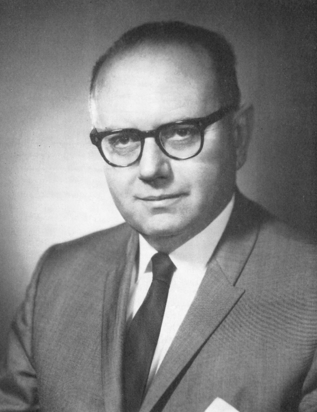
George Garvy (1913-1987) was the son of two revolutionaries in Riga, now part of the Soviet Union. He received his secondary education in Berlin and earned his graduate degrees at the Sorbonne and the Institute of Statistics in Paris. At the outbreak of World War II, he joined the French Army. Following the war, he moved to the United States and received a Ph.D. in economics from Columbia University in 1951. He taught at New York University, Columbia University (lecturer on and off from 1949-1968), and the School of Business at Stanford University.
Dr. Garvy was well known as an economist who was an authority on monetary policy. In 1953, he was appointed as an officer of the Federal Reserve Bank of New York. He became a vice president and senior adviser there in 1974. In 1969, he wrote a report with Martin R. Blyn, “The Velocity of Money,” which sought to discredit Milton Friedman’s theory that changes in the supply of money are a key determinant of economic change.
In 1977, his book Money, Financial Flows, and Credit in the Soviet Union was published by Cambridge Mass.: Balinger Publishing Company. One central theme of this work is noted in a concluding statement “the Reform has failed in its central objective-to provide financial incentives powerful enough to maximize enterprise efforts to introduce advanced technology” (p.185).
Sources of information for George Garvy
http://www.nytimes.com/1987/10/08/obituaries/george-garvy-is-dead-ex-us-bank-official.html?pagewanted=print
http://journals.cambridge.org/action/displayAbstract?fromPage=online&aid=7541848&next=true&jid=JEH&volumeId=38&issueId=04
http://en.wikipedia.org/wiki/American_Finance_Association
http://ssdi.rootsweb.ancestry.com/cgi-bin/ssdi.cgi
Photograph provided by Blackwell Publishing for the American Finance Association
Roger Franklin Murray 2nd (1964)

Roger Murray 2nd (1911-1998) received his B.A. from Yale University in 1932, graduating Phi Beta Kappa. He then completed his MBA and Ph.D. from the New York University Graduate School of Business Administration.
Prior to joining the academic world, Dr. Murray had served as vice president of the Bankers Trust Company, as well as vice president and economist for College Retirement Equities Fund and Teachers Insurance and Annuity Association. At Bankers Trust, Dr. Murray quickly found his specialty in investment strategy. He then transferred his knowledge and experience to the Columbia University Business School, where he had accepted his first teaching position, and remained there for over 40 years.
Professor Murray maintained a significant presence at Columbia, from teaching and serving on the board of trustees, to eventually becoming associate dean of the S. Sloan Colt Professor of Banking and Finance (professor emeritus and distinguished lecturer). Dr. Murray was an avid mentor for many students, and faculty members had often attributed students’ successes to his guidance and teachings.
In addition to being an exemplary scholar and instructor, Dr. Murray was also a forward thinking leader. Throughout his career, he was able to assist with some of the United States most complex economic issues. In the 1950s and 1960s, he was a frequent advisor, as an economist, to many congressmen and business leaders. He worked on the Graham and Dodd’s security analysis at one point in his career. Dr. Murray was also an originator of the concept of the individual retirement account. In 1962, he worked for the passage of the Keogh Act, enabling self-employed people to have a tax-deferred pension account. In addition, he offered valuable advice to banks as he cautioned them to pursue aggressive equity portfolios. Additional accomplishments included serving as a research associate for the National Bureau of Economic Research.
Sources of information for Roger F. Murray
http://www.jstor.org/pss/251013
http://www.nber.org/authors/roger_murray
http://www.nytimes.com/1998/04/17/business/roger-murray-2d-86-economist who-was-an-adviser-to-congress.html
http://www.nytimes.com/1998/04/16/classified/paid-notice-deaths-murray-dr-roger-f-ii.html
http://www.gabelli.com/halloffame/
http://ideas.repec.org/b/nbr/nberbk/murr68-1.html
http://en.wikipedia.org/wiki/American_Finance_Association
Photograph from the GAMCO Asset Management website
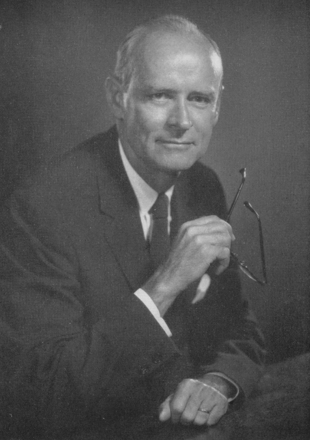
George Conklin Jr. (1915-2005) graduated summa cum laude from Dartmouth College. He later obtained an MBA from their Tuck School of Business Administration, a Ph.D. in economics from New York University, and another doctorate in finance from Columbia University. He also served as an adjunct professor of finance while at NYU.
Dr. Conklin was considered to be an expert in the insurance industry’s prominent. In 1939, he joined Guardian Life Insurance Company of America and was appointed president and CEO in 1971. He was regarded as a forward-thinking executive who led the company into the computer age, advanced economic research, and brought new management disciplines to the organization. Guardian president and CEO, Dennis Manning, is quoted as saying that Dr. Conklin “led the company into a new and larger world and dynamically upheld Guardian’s goal of enriching lives.” Dr. Conklin became chairman of the board in 1977 and continued to lead the company until his retirement in 1980. Following his retirement, he remained involved with the company by serving on the board of directors until 1995.
Dr. Conklin also served as a director at numerous organizations, including the Teachers Insurance and Annuity Association (TIAA/CREF), Hubbard Real Estate Investments, Central Savings Bank, Adelphi University, The Life Insurance Council of New York, Excelsior Bond Fund, Woodlawn Cemetery, and The Solomon Brothers Center for Study of Financial Institutions. Dr. Conklin served as an officer, president or chairman of professional organizations such as the Conference of Business Economists, American Economist Society, American Statistical Association, National Bureau of Economic Research and the New York Chamber of Commerce and Industry Association.
Sources of information for George T. Conklin, Jr.
http://www.prnewswire.com/news-releases/george-t-conklin-jr-former-chairman-and-ceo-of-the-guardian-life-insurance-company-of-america-passes-away-at-age-90-55723482.html
http://en.wikipedia.org/wiki/American_Finance_Association
Photograph provided by Blackwell Publishing for the American Finance Association
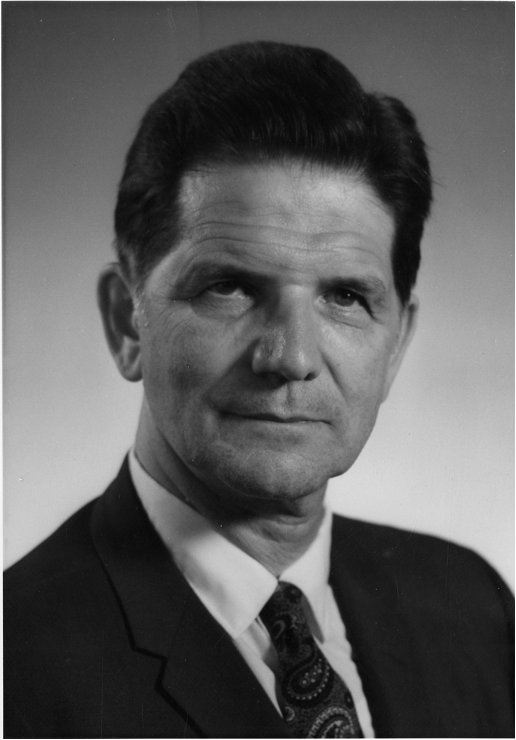
Bion Howard (1913-1994) received his Ph.B. from the University of Chicago in 1933 (Phi Beta Kappa), his MBA in 1940, and his Ph.D. in 1950, both from Northwestern University. He served as a visiting graduate professor of finance at Stanford University, the University of Virginia, and the University of Capetown in South Africa. Prior to the start of his academic career, Dr. Howard worked as an assistant buyer for Montgomery Ward and Company. During and following World War II, he served as an economist and price executive in the Consumer Durable Goods Branch of the Office of Price Administration in Washington.
Professor Howard had been a lecturer at the Northwestern Kellogg School of Management during the 1930s, and then became an assistant professor there in 1947. After eight years at Kellogg, he was appointed a full professorship. In 1961, he served as department chair until his retirement, in 1962, as the Nathan and Mary Sharp Professor of Finance. His research interests included investment performance of common stocks, securities, small business finance, and investment banking. Dr. Howard wrote numerous papers and two books on investment banking. He assisted in developing many new theories of securities investments.
Dr. Howard was a founding member of the Institute of Chartered Financial Analysts. He received the institute’s C.S. Shepherd Award for his leadership there. He also belonged to the American Economic Association, the American Risk and Insurance Association, and the Investment Analysts Society in Chicago. He served on the board of directors of several Midwest corporations, including Transport Electronics, United Wire Craft Corps of Chicago (and assisted with its start up), Cardiff Industries, and Dayton Aviation Radio and Equipment.
Dr. Howard and his wife were active in the Unitarian Church in Evanston and the Parent Teachers Association during the 1950s and 1960s. He was also active in public service in Rock Bridge County, Virginia. They retired to Lexington, Virginia in 1981, and Dr. Howard became a recognized authority on reforestation. He also operated an award-winning tree farm just outside of Lexington.
Sources of information for Bion B. Howard
http://articles.chicagotribune.com/1994-04-01/news/9404010099_1_assistant-professor-management-school-management-of-northwestern-university
http://en.wikipedia.org/wiki/American_Finance_Association
Additional information provided by the Northwestern University Archives
Photograph provided by the Northwestern University Archives
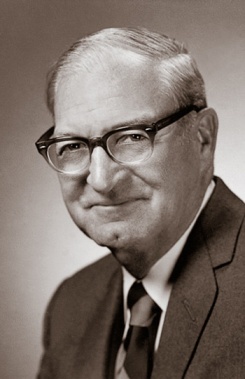
Arthur Weimer (1909-1987) attended Beloit College, where he earned his A.B. in 1929. He then continued his education at the University of Chicago, where he obtained an A.M. in 1931, and a Ph.D. in 1934. Later, Dr. Weimer was awarded honorary LL.D.s from the American Graduate School of International Management (1946), Beloit College (1950), and Indiana University (1982). He completed a mid-career term of military service in the United States Army during World War II (1942-1945), where he attained the rank of major.
Professor Weimer taught briefly at Alma College and the Georgia School of Technology. He also was as a field research supervisor and a housing economist for the Federal Housing Administration from 1934-1937. In 1937, Dr. Weimer joined the faculty at the School of Business at Indiana University. There, he was a professor of real estate and land economics. He was dean of the Indiana University School of Business from 1939 to 1963, where he directed its growth to become one of the leading business schools in the nation.
Professor Weimer was a co-author of the book Principles of Real Estate, a leading textbook in the field. He played a prominent role in the post-World War II growth of savings institutions. He was a consulting economist with the United States League of Savings Institutions, and served as interim director of the league’s Washington office in 1973.
Dr. Weimer was active in many professional business organizations and assumed a number of federal consultant positions with the United States Government. He was highly active in business and philanthropic organizations. He was president of the American Assembly of Collegiate Schools of Business, the Beta Gamma Sigma, and the vice president of the Indiana Educational Services Foundation. He also maintained positions as board of directors with various organizations.
Following his resignation as dean of IU School of Business in 1963, Dr. Weimer remained a strong presence there as a professor of real estate administration, professor of real estate and land economics, Savings Association Professor Emeritus of Real Estate and Land Economics, special assistant to the president, and founding director of the university’s Aerospace Research Applications Center. In his later years, Dr. Weimer worked as an economic consultant to the United States League of Savings Associations, the Federal Deposit Insurance Corporation, the United States League of Savings Associations, and as a member of the Presidential Task Force on Low-Income Housing and the Board of Directors of the United States Chamber of Commerce. Upon his retirement in 1979, the university established the Weimer Chair of Business Administration and the Weimer Fund for Innovation.
Sources of information for Arthur M. Weimer
http://www.nytimes.com/1987/04/08/obituaries/arthur-m-weimer-77-educator-on-business.html
http://webapp1.dlib.indiana.edu/findingaids/view?brand=general&docId=InU-Ar-VAC0085&doc.view=print
http://en.wikipedia.org/wiki/American_Finance_Association
Photograph provided by the Office of Archives and Records Management at Indiana University Bloomington

Paul Van Arsdell (1905-1994) earned his bachelor’s and master’s degrees in accounting (1927 and 1929, respectively) and a Ph.D. in economics in 1935, all from the University of Illinois. In addition maintaining a lengthy academic career, Dr. Van Arsdell also served as a consultant for many corporations, and as a principal business economist for the Office of Price Administration in 1942. From 1943 to 1946 he served in the military as an officer in the United States Navy in Washington D.C.
Professor Van Arsdell joined the faculty at the University of Illinois in 1927, teaching both finance and economics. He was well recognized for both his instruction and scholarship. He continued to teach throughout his career, even during times when he held administrative positions. Dr. Van Arsdell has also authored numerous publications, including the popular text, Corporate Finance: Policy, Planning, Administration.
Starting in 1957, Dr. Van Arsdell became head of the finance department at the U of I, and served in that position until he retired from the university in 1971. Following his retirement, Dr. Van Arsdell taught at Florida Atlantic University and Miami of Ohio. At Miami, he was the Armco Alumni Professor of Finance. He had such an affinity for teaching that in 1976, former students established the Paul M. Van Arsdell Award in Finance at the College of Commerce in honor of his dedication to the field. The award is given to graduate teaching assistants who demonstrate outstanding scholarship and teaching ability.
Dr. Van Arsdell was also co-founder and former president of the Midwest Finance Association from 1954-1956, He assisted in founding the Southern Finance Association. Other achievements included serving as: chairman of the board of the University of Illinois YMCA, president of the Kiwanis Club, a member of the board of directors of the Citizens Building Association of Urbana, a member of the Illini Union Board, as well as an active member of Sigma Alpha Epsilon.
Sources of information for Paul M. Van Arsdell>
http://articles.chicagotribune.com/1994-10-11/news/9410110076_1_urbana-american-finance-association-board
http://news.illinois.edu/ii/94/10-20-94/deaths.html
http://xerxes.library.nd.edu.proxy.library.nd.edu/quicksearch/metasearch/results/000495/275898-
Photograph from the Illinois College of Business website
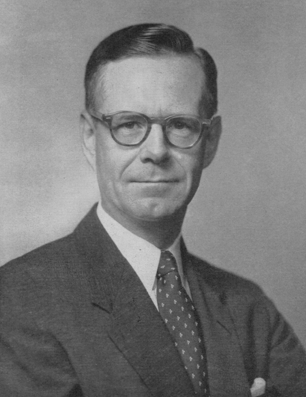
James O’Leary (1914-2000) received two degrees from Wesleyan University – an A.B. in 1936 and an M.A. in 1937. He completed his Ph.D. in economics from Duke University in 1941. At this time, Dr. O’Leary was a member of Phi Beta Kappa, Alpha Chi Rho, and Pi Gamma Mu. During World War II, Professor O’Leary taught economics at Wesleyan University from 1939-1942, at the Air Navigation Flight Preparatory School in Middleton, Connecticut. He later was hired as an assistant Professor at Wesleyan and taught there from 1943-1945. Dr. O’Leary then became an associate professor in economics at Duke University for the 1946 academic year.
Dr. O’Leary was hired as a consultant for the Connecticut General Life Insurance Company from 1945-1946, and served in various positions with the Life Insurance Association of America. He became the director of research for the committee on public debt policy while at Duke. In May of 1947, he resigned from his position at Duke to become director of research for the Life Insurance Investment Research Committee. Dr. O’Leary was a member of the board of directors of Bowery Savings Bank, the Guardian Life Insurance Company, and the American Atlantic Mutual Insurance Company.
From 1967 to 1969, Dr. O’Leary served as chairman and chief economist at Lionel D. Edie & Company. At around this time, he joined the United States Trust as an executive vice president and economist, and served there for ten years. He also became vice chairman of the United States Trust Company of New York. From 1976 to 1980, Dr. O’Leary served on the board of the National Bureau of Economic Research and became its chairman during that time as well. Later in his career, Dr. O’Leary published two of his books, Stagnation or Healthy Growth? and The Challenge to the United States in the 90’s (University Press of America).
Sources of information for James J. O’Leary
http://www.nytimes.com/2000/03/03/business/james-j-o-leary-85-an-economist.html?pagewanted=1&pagewanted=print
http://books.google.com/books?id=lZcR19dG1_gC&pg=PA127&lpg=PA127&dq=James+J.+O’Leary,+Phd+economist&source=bl&ots=NhetTBQt8o&sig=rgZEFz4JhnvKlWkKIBL8lGbG1h0&hl=en&sa=X&ei=HzNlU9rQJ4XN8wHR54HQCw&ved=0CDAQ6AEwAg#v=onepage&q=James%20J.%20O’Leary%2C%20Phd%20economist&f=false
http://en.wikipedia.org/wiki/American_Finance_Association
Additional biographical information provided by Duke University Archives
Photograph provided by Blackwell Publishing for the American Finance Association

Lester Chandler (1905-1988) received his B.A. from the University of Missouri and his doctorate in economics from Yale University. He was well known as an economist, an author, and an adviser to the federal government during World War II. As a monetary expert, Dr. Chandler worked in the rubber and chemical branches of the Office of Price Administration during World War II, first as price executive and then as an economic adviser. After the war, he conducted research for the congressional subcommittee on Monetary and Fiscal Policy of the Joint Economic Committee. In 1953, he became public director and deputy chairman of the board of directors of the Federal Reserve Bank of Philadelphia.
Dr. Chandler taught at Dartmouth College and Amherst College prior to joining the Princeton University faculty in 1950 as its first Gordon S. Rentschler Memorial Professor of Economics. In addition to serving as chairman of the Department of Economics at Princeton, Dr. Chandler also served as acting director of Princeton’s Woodrow Wilson School of Public and International Affairs (1963-1964).
Professor Chandler’s well known book, The Economics of Money and Banking, was originally published in 1948 and co-authored in 1986 with Stephen M. Goldfeld. Dr. Chandler also wrote America’s Greatest Depression 1929-1941, found in the Journal of Money, Credit, and Banking. His purpose for this publication, in his words, “is to describe, in terms comprehensible to all with even a minimum knowledge of economics, the major economic events during the depression, impacts of the depression on various economic and social groups, major policy responses to the depression, and some of the economic and political ideas that help to explain the policy responses.”
Dr. Chandler and his wife, the late Elizabeth R. Chandler, were active in the Princeton Association for Human Rights, the Princeton Committee for the NAACP and nearby integrated housing projects.
Sources of information for Lester V. Chandler
http://www.nytimes.com/1988/07/18/obituaries/lester-v-chandler-economist-dies-at-82.html
http://www.jstor.org/discover/10.2307/1991426?uid=3739256&uid=2129&uid=2&uid=70&uid=4&sid=21103728269331
http://en.wikipedia.org/wiki/American_Finance_Association
Photograph from the Economics USA website
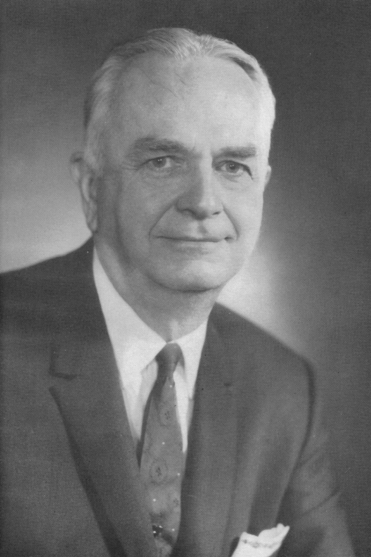
Marshall Ketchum (1906-1989) received both a bachelor’s and master’s degree from Syracuse University, and later completed his doctorate at the University of Chicago. Prior to joining the faculty at U of C, he had taught at Duke University, Utah State University, and the University of Kentucky.
Dr. Ketchum was professor emeritus of finance at the University of Chicago’s Graduate School of Business, where he taught from 1946 until 1971. Over the course of many years, he had conducted the business school’s seminar for financial analysts. His research interests span a broad range from business administration, to financial economics, and economic systems. More specifically, he was well known for his contributions to the area of investments and financial management. He collaborated on his work with eight authors from 1942-1956. Throughout his academic career, Professor Ketchum has written more than 50 books and scholarly articles.
Dr. Ketchum was very active within the American Finance Association. He was elected vice president, chairman of the board of directors, chairman of the advisory committee, and chairman of the editorial board. He also served as the editor of its Journal of Finance from 1946 to 1955.
Dr. Ketchum was also an editorial adviser and general editor in finance for the Houghton Mifflin Company. For many years, he managed annual educational programs for members of the financial community – the Life Officers Investment Seminar and the Financial Analysts Seminar. He also was the director of the conference on savings and residential financing, and chairman of the Conference’s executive committee and editor of the proceedings.
Sources of information for Marshall D. Ketchum
http://www.chicagobooth.edu/~/media/C2BEE8FA6E86491BB918D45E2C8A7E86.pdf
http://www.nytimes.com/1989/11/14/obituaries/m-d-ketchum-83-professor-of-finance.html
http://65.54.113.26/Author/28457467/marshall-d-ketchum
http://en.wikipedia.org/wiki/American_Finance_Association
http://ssdi.rootsweb.ancestry.com/cgi-bin/ssdi.cgi
Photograph provided by Blackwell Publishing for the American Finance Association
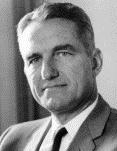
Miller Upton (1917-2005) was raised in New Orleans, Louisiana. He attended Tulane University for his undergraduate studies, where he was president of the student body. His achievements as a tackle on the football team earned him a place on the All-America team chosen by Sports Illustrated. He later earned an MBA from Harvard University and a Ph.D. from Northwestern University.
Professor Upton taught at Washington University in St. Louis. He also served as dean of the School of Business and Public Administration, Northwestern University, and Lake Forest College. Later, Dr. Upton accepted a position at Beloit College, and served as president there for 21 years. During this time, he created innovative methods of maximize the college’s educational and financial resources. During his presidency, he created an intensive study of the college’s performance and mission, followed by wide-ranging initiatives (most notably his plan for keeping the college operating year-round).
In 1963, Dr. Upton was awarded a $1.6 million grant from the Ford Foundation to carry out the Beloit Plan. The Beloit Plan, created in 1964, was intended to increase the number of students to maximize the use of facilities, and to gain greater revenue through tuition. There was a three term structure, rather than two, that also ran through the summer. Other universities and colleges implemented parts of this plan as well. For example, Dartmouth College used a similar idea to create more spaces for women when it began to admit them in 1973. Under the plan, Beloit student enrollment and budget changes increased considerably, starting in 1963.
In addition to increasing Beloit’s enrollment and creating a financial surplus, Dr. Upton was responsible for the construction of several new buildings, including a library, a science center and a performing arts center. In 1960, he instigated the World Outlook program to coordinate foreign study opportunities. Roughly 40 percent of Beloit students now study abroad in their college years. In 1971, he set up a sliding scale of tuition fees, with students paying different amounts based on their ability to pay. In 1975, Dr. Upton resigned from his career in academics.
Sources of information for Miller Upton
http://www.nytimes.com/2005/12/20/obituaries/20upton.html?_r=0
http://en.wikipedia.org/wiki/American_Finance_Association
Photograph from the Beloit College website

Norris Johnson (1923-1997) served as a sergeant in the United States Army during World War II. Dr. Johnson held numerous administrative positions throughout his career. He served as vice president of the First National City Bank of New York and co-editor of its monthly letter on economic conditions. He later became president of The B68 First National City Bank of New York. In 1956, Dr. Johnson became a member of the advisory committee to the Senate Banking and Currency Committee on Study of Banking Laws.
Dr. Johnson served as a consulting economist with the United States League of Savings Institutions. The United States League of Savings Institutions was created to promote standards of professionalism and congressional lobby influence. It also promoted public education and focused on federal regulatory authorities. The organization’s name was officially changed in 1995 to what is currently known as America’s Community Bankers. In addition to his work with the United States League of Savings Institution, Dr. Johnson was also a board of trustees member for the National Organization for Raw Materials, which is an organization dedicated to scientific economic analysis and education.
Dr. Johnson was the author of many articles and reports throughout his career. Some of his noteworthy publications were included in the Journal of Finance include Outlook for the Short Term Money Market, Financing Industrial Growth, and Impact of Recent Credit and Debt Management Policies Upon the Commercial Banks. His article, “Climate for Growth,” was published in National Civic Review.
In addition to his work in the corporate and government arenas, Dr. Johnson also was active in philanthropic causes. He implemented his leadership skills as the first president of the Brooklyn Center Lions Club. The Brooklyn Center Lions Club is part of the Lions Club International, which is the world’s largest service organization comprised of volunteers to help those in need.
Sources of information for Norris O. Johnson
http://www.investopedia.com/terms/u/u-s-league-of-savings-institutions.asp
http://www.locategrave.org /l/3035625/Norris-O-Johnson-MN
http://www.zoominfo.com/p/Norris-Johnson/743871189
http://www.jstor.org/stable/2976724
http://ssdi.rootsweb.ancestry.com/cgi-bin/ssdi.cgi
http://en.wikipedia.org/wiki/American_Finance_Association
Photograph provided by Blackwell Publishing for the American Finance Association
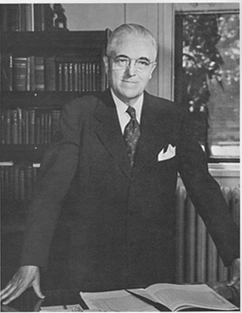
Garfield Cox (1893-1970) joined the Religious Society of Friends (Quakers) during his childhood. He began his post-secondary education at Earlham College and later transferred to Beloit College, where he graduated in 1917. He began his teaching career at Wabash College, where he created the first department of public speaking there. As a conscientious objector to the World War I, Dr. Cox opted to serve with the newly formed American Friends Service Committee relief and reconstruction work in France, in lieu of military service.
In 1920, Dr. Cox joined the faculty at the University of Chicago. He received his Ph.D. at the U of C in 1929 and was hired as a professor of finance there in 1930. He was named to the Robert Law Professorship in 1936, when it was first established. Despite struggling with a tuberculosis diagnosis in 1938, Dr. Cox was highly successful throughout his career. In 1942, he was appointed acting dean of the School of Business, and then dean from 1945-1952. He retired in 1958 and moved to Claremont, California where he lectured at the Claremont Graduate School and the Southern California School of Theology.
Dr. Cox was noted for having excellent public speaking skills and was a speaker or moderator for several radio broadcasts on economic issues. He published a Business Forecast yearly and a review and re-forecast every half year. Two of his publications, Forecasting Business Conditions (1927), with Charles O’Hardy; and An Appraisal of American Business Forecasts (1930) received much national attention and praise.
In 1947, Dr. Cox was awarded the Nobel Peace Prize. Additional accomplishments of Professor Cox include the following: founder of South East National Bank in the Woodlawn neighborhood of Chicago; chairman of the board of South East National Bank from its founding until his retirement in 1959; chairman of the committee’s Midwest bank and executive board; president of the Chicago Chapter of the American Statistical Association; and spokesman of the Council of the Senate, the highest elective office at the University of Chicago.
Dr. Cox received honorary LL.D.s from Beloit College in 1946 and Earlham College in 1963. He was also named a Trustee of Earlham. Dr. Cox was also a founding member and clerk of the 57th Street Meeting of the Religious Society of Friends.
Sources of information for Garfield V. Cox
http://archiver.rootsweb.ancestry.com/th/read/INMONTGO/2009-02/1234616618
http://www.dailykos.com/story/2011/02/06/941655/-Meet-my-Grandfather-Garfield-V-Cox
http://en.wikipedia.org/wiki/American_Finance_Association
Photograph from the Daily Kos website
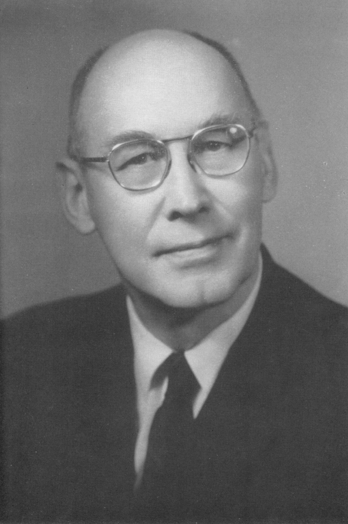
Roland Robinson (1907-1986) received his undergraduate degree from Western Illinois State Normal school, and his doctorate from the University of Michigan. Following graduation, he accepted an assistant professorship at Northwestern University and resided in Skokie, Illinois while teaching at Northwestern from 1947-1956.
Throughout his career, Dr. Robinson specialized in central banking, and held the position of professor of banking for six years. In 1953, his title was changed to professor of finance at Northwestern. This same year, he became chairman of the finance department, within the school of commerce, and served there until 1956. In 1956, Dr. Robinson was also appointed as an advisor in the Boards Division of Research and Statistics.
For five years, Dr. Robinson served as a moderator for Northwestern Institute of Management. During the year prior to his appointment, he had taken leave to work on a project for the National Bureau of Economic Research. For 12 years, Dr. Robinson had served as an economist on the Board of Governors for the Federal Reserve System. He left the board in 1946 to work as an economist for the National Association of Mutual Savings Bank, and also to work as a consultant for the Treasury Department and the Board of Governors.
Dr. Robinson is the author of Management of Bank Funds, several bulletins and reports for the Federal Reserve System, and numerous magazine articles on banking. A few of his articles include “Devaluation and Britain’s Currency Dilema,” “A New Supervisory View of Bank Capital,” and “Banking Risks, Past, Present, and Future.” Two of his book reviews have included Inflation in United States and Personal Income Tax Reduction in a Depression.
Sources of information for Roland I. Robinson
http://heinonline.org/HOL/Page?handle=hein.journals/fedred42&div=97&g_sent=1&collection=journals#937
http://en.wikipedia.org/wiki/American_Finance_Association
Additional biographical information provided by Northwestern University Archives
Photograph provided by Blackwell Publishing for the American Finance Association
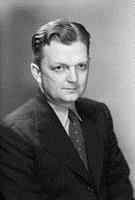
Edward Edwards (1908-1984) came to Indiana University to seek higher education, earning a bachelor’s degree in 1928 and a master’s degree in 1934. Prior to his entrance into academia, he worked as a methods engineer for Western Electric, administered the National Youth Administration program in Indiana during the Depression, and served as supervisor of the Division of Research and Statistics of the Indiana Department of Financial Institutions.
Professor Edwards joined the faculty of Indiana University in 1936. His preference for more interactive teaching sessions was evident with his use of the Socratic Method in his classroom. He therefore rarely gave lectures. Professor Edwards was a prominent figure at the university as a principal advisor to the administration of the university and of the School of Business. For many years, he had served as the associate director of the Graduate School of Savings and Loan. His achievements for the Graduate School of Savings and Loan were recognized in the establishment of the Fred T. Greene professorship, which he held until his retirement. During his academic career, he also spent a long tour of duty in the military during World War II.
His national fame in the field of finance and real estate led to service as a consultant to the White House and other top departments of the Federal Government, as well as to financial institutions, the private sector of the American economy, and universities. He was an early administrative assistant to Herman B. Wells, both when Wells directed the Department of Financial Institutions of Indiana, and when he was the president of Indiana University.
Sources of information for Edward E. Edwards
http://www.iu.edu/~uha/search-awards/honoree.shtml?honoreeID=3714
http://en.wikipedia.org/wiki/American_Finance_Association
http://xerxes.library.nd.edu.proxy.library.nd.edu/quicksearch/metasearch/facet?group=000219&resultSet=293284&facet=3&node=1
Photograph provided by the Office of Archives and Records Management at Indiana University Bloomington
Raymond Joseph Saulnier (1951)
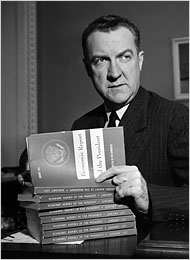
Raymond Saulnier (1908-2009) graduated as president of his class from Middlebury College in 1929. By the time he had finished a master’s degree at Tufts College, and taught introductory economics there, the nation was already facing severe economic hardship due to the Depression. A fellowship from Columbia University allowed him to pursue doctoral work and complete his dissertation, “Contemporary Monetary Theory,” which was eventually published in hardcover.
Following graduation, Dr. Saulnier joined the Columbia faculty, and then transferred to Barnard College, where he taught finance and economics until 1993. Therefore, his academic career spanned four decades between the two colleges, except for six years that he had spent in Washington. He was also a member of the Council of Economic Advisers for two years and its chairman for four years.
A staunch conservative economist, it was fitting that Dr. Saulnier served as chief economic adviser to President Eisenhower in the 1950s. He later served as an adviser to the presidential campaigns of Richard M. Nixon and Barry Goldwater and worked in Ellen R. Sauerbrey’s 1998 Republican campaign for governor of Maryland.
Dr. Saulnier remained interested with current affairs throughout his life. He maintained strong opinions regarding how far he believed that policy makers of both parties had strayed from the tenets of budget balance. Dr. Saulnier had espoused this view rigorously from 1956 to 1961 as a member, and then chairman of the president’s three-man Council of Economic Advisers. Although fiscal discipline was always his chief priority, he insisted that the budget should be in structural balance, meaning that deficits could be justified temporarily during recessions. Dr. Saulnier continued to write, broadcast, advise and correspond into his 90s, often in defense or explication of his record, stressing balanced budgets and contained inflation.
Sources of information for Raymond J. Saulnier:
http://en.wikipedia.org/wiki/American_Finance_Association
Photograph from the New York Times
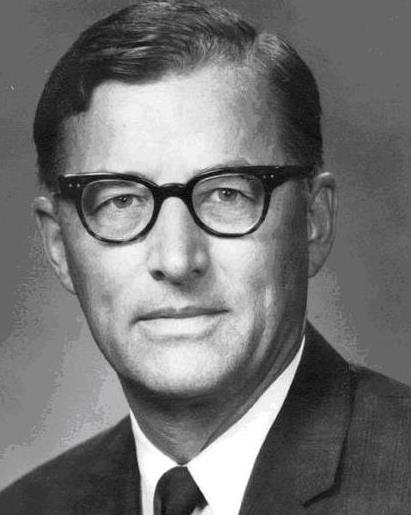
Howard Bowen (1908-1989) earned his bachelor’s degree in 1929 and his master’s degree in 1933, both from Washington State University. He pursued his doctoral studies at the University of Iowa and received his Ph.D. in 1935. He then went on to complete postdoctoral work at the University of Cambridge, England, and the London School of Economics, from 1937 to 1939.
Dr. Bowen’s teaching career commenced at the University of Iowa. He taught economics at the university from 1935 to 1942. After working within the government sector for several years, he returned to academics, securing an appointment as dean of the College of Commerce at the University of Illinois from 1947-1952. Dr. Bowen’s leadership skills there lead to improvements in many programs at the school. Following his tenure at Illinois, he accepted an economics teaching position at Williams College. Later, he accepted a position as president of Grinnell College, where he served until 1964. Improvements noted during Dr. Bowen’s stay as president included an increase in enrollment and endowment. After making such strides at Grinnell, the University of Iowa offered him the position of presidency, starting in 1964. There, Dr. Bowen was often involved in legislative matters, one pertaining to the name change to the University of Iowa. Dr. Bowen’s final academic position was professor of economics and education at Claremont Graduate University, later to become its president for one year.
Dr. Bowen published three salient works, including Investment in Learning, Costs of Higher Education, and American Professors: A National Resource Imperiled. His book, Costs of Higher Education, is best known for covering Bowen’s Revenue Theory of Costs, sometimes called Bowen’s Law. Bowen’s Law stipulates that at any given time, the unit cost of education is determined by the amount of revenues currently available for education relative to enrollment. It expresses the fact that unit cost (i.e., the cost of education) is determined by hard dollars of revenue and only indirectly by considerations of need, technology, efficiency, and market wages and prices. Dr. Bowen’s book provided evidence that higher education institutions of similar size, situation, and repute had drastically different costs per student, and spent each dollar differently from one another. The Association for the Study of Higher Education had provided the Howard R. Bowen Distinguished Career Award annually, since 1991.
Sources of information for Howard R. Bowen
http://en.wikipedia.org/wiki/Howard_Bowen
http://en.wikipedia.org/wiki/American_Finance_Association
Photograph from Iowa Alumni Magazine
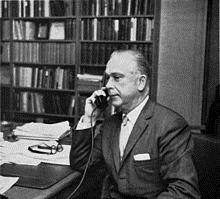
Neil Jacoby (1909-1979) received his B.A. in 1930 from the University of Saskatchewan. In 1938, he received his Ph.D. from the University of Chicago, where he was subsequently hired as a professor of finance. Dr. Jacoby was eventually chosen to serve as vice president of the University of Chicago. In 1948, Dr. Jacoby was hired as a professor and founding Dean for the Graduate School of Management at the University of California Los Angeles. He maintained that position until his retirement in 1973.
Dr. Jacoby was widely recognized as an expert on matters of taxation, finance, economic policy, and business-government relationships. He was the author of 17 books including United States Monetary Policy, United States Aid to Taiwan, European Economics– East and West, Corporate Power and Social Responsibility, Multinational Oil, The Business-Government Relationship: A Reassessment, and Bribery and Extortion in World Business. Dr. Jacoby also wrote more than 200 journal articles, and he gave hundreds of public addresses that were preserved as formal manuscripts.
In addition to his academic work, Dr. Jacoby held a number of other positions. In 1940, he joined the research staff at the National Bureau for Economic Research, and in 1942 he became a member of the Research Advisory Board of the Committee for Economic Development. Dr. Jacoby also served on President Eisenhower’s Council of Economic Advisers from 1953 to 1955, and in 1957 he was a United States representative on the Economic and Social Council of the United Nations. Dr. Jacoby also served as a consultant on taxation and finance for the Los Angeles City Council, and he worked as a consultant for the Rand Corporation from 1951-1961. He was a long-time associate of the Center for the Study of Democratic Institutions at Santa Barbara, and he was a frequent contributor to The Center magazine. Dr. Jacoby was also a member of the Executive Committee for the American Economic Association, a member of the National Council of the National Planning Association, and a member of the Research Advisory Board for the Committee for Economic Development.
Sources of information for Neil H. Jacoby
http://en.wikipedia.org/wiki/Neil_H._Jacoby
http://en.wikipedia.org/wiki/American_Finance_Association
Photograph from UCLA Southern Campus website
Benjamin Haggort Beckhart (1948)
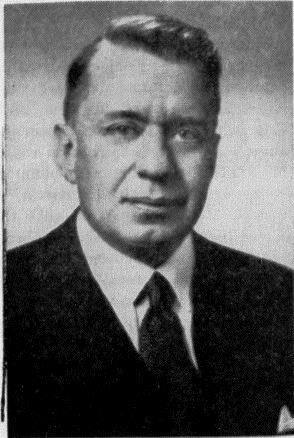
Benjamin Beckhart (1897-1975) graduated Phi Beta Kappa with an A.B. from Princeton University. He received both a master’s degree and a Ph.D. from Columbia University. After teaching banking for one year at Princeton University, he returned to Columbia University where he served on the faculty from 1921 until his retirement in 1963.
Dr. Beckhart was considered to be an expert in the fields of central and comparative banking systems. He was the author or co-author for a number of books, including The Discount Policy of the Federal Reserve System, The Banking System of Canada, Foreign Banking Systems, The New York Money Market, and Banking Systems. Dr. Beckhart also served as a reviewer for numerous publications including books on the Theories of Major Douglas, What Everybody Wants to Know about Money, Recovery and Common Sense, Irving’s Fisher Plan, A Critique of the Gold Standard, and The Supply and Control of Money in the United States.
In addition to his academic work, from 1939 to 1949, Dr. Beckhart served as director of research for the Chase National Bank. He continued to work as an economic consultant for Chase during the next five years, and from 1954 until 1961, he was an economic consultant for the Equitable Life Assurance Society.
Sources of information for Benjamin H. Beckhart
http://query.nytimes.com/mem/archive/pdf?res=F20815FE345C117A93C0AB1788D85F418785F9
http://en.wikipedia.org/wiki/American_Finance_Association
Photograph provided by Vassar College Archives
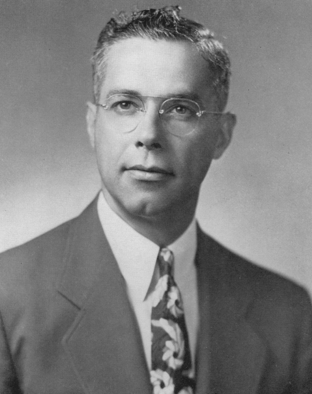
Lewis Froman (1906-1992) obtained his A.B. from the University of Missouri in 1927. Then in 1931, he completed his doctoral work at Cornell University. Dr. Froman began his academic career in 1931 at the University of Buffalo where he held a variety of administrative positions until 1948. He was eventually appointed Dean of the Millard Fillmore College, which was the continuing education school for the University of Buffalo. At that time, the Millard Fillmore College was primarily a night school that was created to provide non-traditional students an opportunity to obtain a college degree. Dr. Froman had previously served as director for a variety of areas including veterans’ affairs, the work-study plan for superior students, the civilian-pilot training, the engineering, science, management war-training programs, and military training.
Dr. Froman accepted a position as an instructor for Cornell University in 1948, and later in the same year, he was chosen to become the 4th president of Russell Sage College. The college had been operating as a non-residential men’s division that provided two years of college for returning veterans, but in 1949, Dr. Froman created a co-educational adult education unit in Albany. The evening division for the unit, which later became the Russell Sage Evening College, offered associate degree programs and a master’s degree in education. In 1957, Dr. Froman received approval in 1957 to establish an independent two-year private junior college that operated on a daytime schedule. In 1970, the Lewis A. Froman Professorship was established by the board of trustees upon his retirement. This endowed position was created in order to support research activities of a new or early career faculty member at Russell Sage College.
In addition to his academic achievements, Dr. Froman served in numerous administrative positions outside of the university setting. He was a representative of the war labor board from 1943 to 1944. While in this position, he was dedicated to obtaining first-hand facts, often traveling to discuss issues with laborers directly at the worksite.
Dr. Froman was also a director and economist for the Niagara National Bank. He received the Junior Chamber of Commerce Gold Key in 1938. This was awarded annually to a male, under the age of 35, who contributed notably to the life of the community.
Sources of information for Lewis A. Froman
http://en.wikipedia.org/wiki/Sage_College_of_Albany
www.sage.edu/research/asset/SRI_December.pdf
“Dr. Froman of U.B. Named President of Russell Sage” Buffalo Evening News. 7/19/1948
“Dr. Froman Named as Representative of Regional WLB” Buffalo Evening News. 9/21/1943
http://en.wikipedia.org/wiki/American_Finance_Association
http://ssdi.rootsweb.ancestry.com/cgi-bin/ssdi.cgi
Additional biographical information provided by the University at Buffalo archives and Sage College Libraries
Photograph provided by Blackwell Publishing for the American Finance Association
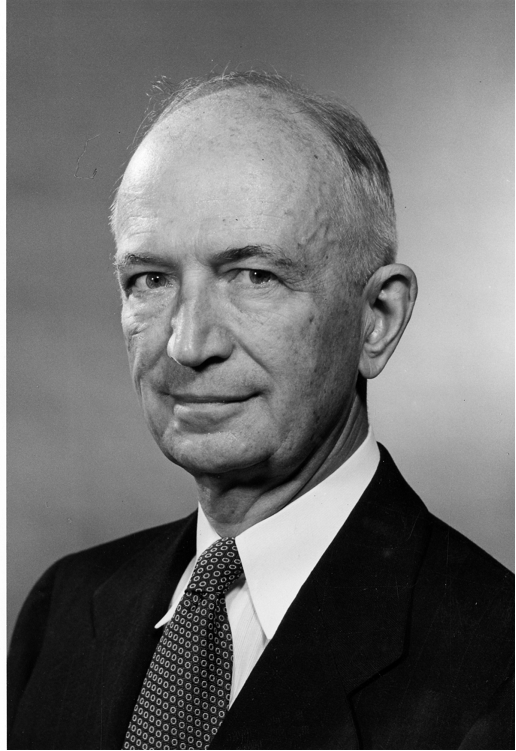
Harry Guthmann (1896-1981) obtained his B.A. from Syracuse University in 1917, an MBA from New York University in 1921, and a PhD from the University of Chicago in 1929. While in graduate school, he became a Certified Public Accountant. His employment history included work as a bank clerk, a junior public accountant, an income tax deputy, a financial consultant, and an officer within a real estate corporation. However, he primarily considered himself to be a teacher. From 1917 to 1921, Professor Guthmann was an instructor in economics and accounting at Syracuse University. When he received his MBA degree in 1921, he was promoted to assistant professor of finance at Syracuse, and the following year he was hired as an associate professor in finance at the University of Texas where he worked until 1925. He then entered a PhD program and accepted a position a research assistant at the University of Chicago from 1925 to 1926. The following year, 1927, while he was still working on his PhD degree, Dr. Guthmann accepted a position as an assistant professor of finance at Northwestern University. In 1930, he was promoted to associate professor at Northwestern in 1930 and promoted to full professor in 1935. In 1949 he was named the Charles E. and Emma H. Morrison Professor of Finance at Northwestern where he continued to work until his retirement in 1965.
Throughout his academic career, Dr. Guthmann was an avid writer and a sought-after consultant for tax and valuation matters. He also testified before congress on several occasions. His textbook on Analysis of Financial Statements was initially published in 1925, and the fourth and finally edition appeared in 1953. His textbook on Investment Principles and Practices, was co-authored with Ralph Badger and H.W. Torgerson, and continued for six editions. His textbook on Corporate Financial Policy was co-authored with Herbert Dougall and appeared in four editions that sold over 250,000 copies. Dr. Guthman also served as a trustee and member of the Executive Committee for the Teachers Insurance and Annuity Association from 1947 to 1951.
Sources of information for Harry G. Guthman
http://findingaids.library.northwestern.edu/catalog/inu-ead-nua-archon-1139
http://en.wikipedia.org/wiki/American_Finance_Association
Photograph provided by the Northwestern University Archives
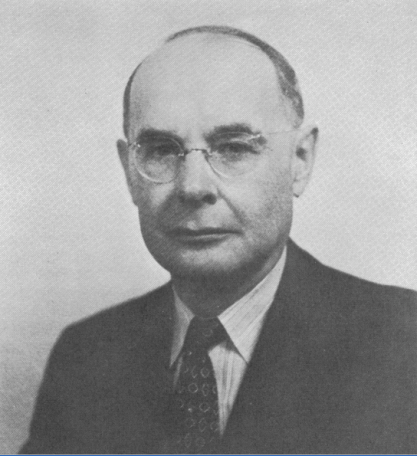
John Clark (1884-1961) received a B.A. degree in 1905 from the University of Nevada and an LLB degree from Columbia Law School in 1907. He began a law practice in Cheyenne, Wyoming. However, he subsequently went back to school, and received a PhD in economics from John Hopkins University in 1931. During the period from 1931 to 1946, he taught economics at several different schools, and in 1938, he received his LLD from the University of Nebraska Law School.
From 1919 to 1946, Dr. Clark was a director for the American National Bank of Cheyenne, and from 1946 to 1953 he served as one of the original members of the United States Council of Economic Advisors. The Council of Economic Advisers was established by the Employment Act of 1946 and provided the President with objective economic analysis and advice regarding a wide range of domestic and international economic policy issues. The initial Council consisted of three members who were appointed by President Truman. The other two members were Leon H. Keyserling and Edwin G. Nourse. The three members often disagreed on the functions of the committee, but were still able to provide Harry S. Truman with sound economic advice. Work that is maintained under the heading of “John D. Clark Papers” includes monthly, quarterly, and annual reports of the Council of Economic Advisers to President Truman. Other work in this collection includes economic reports of the President, an unpublished manuscript about the Council of Economic Advisers that was written by Dr. Clark, and letters, memoranda, and other items related to the work of the initial Council of Economic Advisers.
Dr. Clark held numerous additional administrative positions throughout his career. In 1912, Dr. Clark served as a delegate at the Democratic National Convention in Baltimore, Maryland. From 1923 to 1926, he was vice president of the Standard Oil Company of Indiana. Dr. Clark was also a member of the American Economic Association as well as the American Finance Association. From 1937 to 1939, he served as an adviser to the United States Senate Committee on Government Reorganization, and in 1941 became a member of the Wyoming legislature.
Sources of information for John D. Clark
http://www.nndb.com/people/693/000161210/
http://www.trumanlibrary.org/hstpaper/jclark.htm
http://en.wikipedia.org/wiki/American_Finance_Association
Photograph provided by the Blackwell Publishing for the American Finance Association
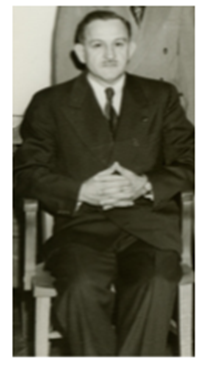
Charles Prather (1899-1978) was as an infantryman in World War I and received several medals for his service including the Croix de Guerre. The Croix de Guerre honor may either be awarded to an individual or as a unit award to those soldiers who distinguish themselves by acts of heroism involving combat with the enemy. Following his service in World War I, Charles Lee Prather earned a bachelor’s degree from Eastern Illinois State University in 1922. In 1923, he obtained a master’s degree, and then a doctorate in 1927, both from the University of Illinois. Professor Prather then taught at the Universities of Illinois, Pittsburgh, Washington, and Syracuse. However, his academic career was subsequently interrupted when he was called to serve as a colonel in the United States Army during WWII.
After World War II, Dr. Prather joined the faculty at The University of Texas at Austin as a professor of banking and finance. He also served as chairman of the Department of Finance from 1948 to 1953. Dr. Prather was recognized with a teaching excellence award from the University of Texas Students’ Association in 1963. The following year, he was awarded the Jack G. Taylor Teaching Excellence Award from the College of Business Administration. He continued to teach at UT Austin until his retirement in 1966.
Dr. Prather was regarded as a leader in his field and wrote a best-selling textbook on Money and Banking which was originally published in 1937 and included 6 editions. The expressed intent for writing this text was to set forth the elementary principles of money and banking and to discuss financial history but to retain a focus on current problems as they evolved over the the years. Dr. Prather also published books on Financing Business Firms, History of the Gold Policy of the Federal Reserve System, Manual of Objective Tests for Money and Banking, and Early Economic Agricultural History of Illinois. In addition, he was a co-author, with Bennie B. McNew, for the book Fraud Control for Commercial Banks.
Sources of information for Charles L. Prather
http://www.utexas.edu/faculty/council/2000-2001/memorials/AMR/Prather/prather.html
http://www.goodreads.com/book/show/7456132-money-and-banking
http://books.google.com/books/about/Money_and_Banking.html?id=asBAAAAAIAAJ
http://en.wikipedia.org/wiki/American_Finance_Association
Photograph provided by The Dolph Briscoe Center for American History
Chelcie Clayton Bosland (1941)

Chelcie Bosland (1907-1997) received a bachelor’s degree in 1923 and a master’s degree in 1924. Both degrees were awarded by the University of Minnesota. He received a Ph.D. degree in economics from the University of Michigan in 1929. In 1929, Dr. Bosland was hired as an assistant professor of economics at Brown University where he worked until his retirement in 1968. He served as Chair of the Department of Economics at Brown University from 1937 to 1949, and in 1945, Dr. Bosland was named Eastman professor of Political Economy. He was also a visiting professor at Clark University, Worcester University, and Northwestern University.
Dr. Bosland’s scholarly interests included corporate finance, public finance, and public regulation of industry. He was known for developing methods of valuing corporations that were accepted by tax courts, where he testified often. He published numerous articles in leading academic journals. He was the author of four books and a co-author for a fifth book.
Professor Bosland was a member of the American Economic Association, and he was one of the founders of the American Finance Association. From 1950 to 1951, Dr. Bosland served as Chairman of the Fiscal Advisory Council for the State of Rhode Island, and in 1957, he served as Chairman of the Special Rhode Island Commission to appraise the financial operations of the state government and financial relations. In addition, Dr. Bosland served terms on the advisory commission for the Rhode Island Development Council, the Small Business Administration Advisory Council for Rhode Island, the Providence Society of Financial Analysts, and the Brown University Commission on Consultation between Corporation and Faculty. He also served one term as president of the Brown Faculty Club.
As a member of the Warwick School Committee for eight years, Dr. Bosland served as its chairman from 1948 to 1954. He was chairman of the Rhode Island School Boards Association, and the Committee for the Study of Financial Support for the Providence Schools (1962-63). He was vice president of the Rhode Island Citizens Association for Public Schools, as well as the Rhode Island Blue Cross. He was a member of the board of directors of Physicians’ Service, and the board of directors of the Rhode Island Health Facilities Planning Council. Honorary scholastic societies that Dr. Bosland belonged to included Phi Beta Kappa, Beta Gamma Sigma, and Lambda Chi Alpha. Dr. Bosland had been a board member of the Greater Providence YMCA. He was an elder, chairman, and Board of Trustees for the Greenwood Community Church. He was also chairman of the Westminster Foundation of New England.
Sources of information for Chelcie C. Bosland
http://en.wikipedia.org/wiki/American_Finance_Association
Additional biographical information provided by the Brown University Archives
Photograph provided by the Brown University Archives
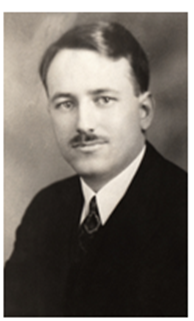
Kenneth Field (1903-1968) graduated first in his class, with an A.B. from the University of Maine in 1925. He obtained an M.A. from the University of Illinois in 1926, and a Ph.D. in economics from the University of Illinois in 1928. In 1936, Dr. Field received a J.D. from Northwestern University Law School, and in 1940 he became a member of the publications committee for the American Business Law Association. During his time as a student, he received four scholarships as an undergraduate, in addition to one scholarship and two fellowships as a graduate student. He was also a member of Beta Gamma Sigma, Beta Alpha Psi, Delta Sigma Pi, Masque, and several other honorary and professional fraternities.
From 1928 until 1936, Dr. Field worked at the University of Colorado at Boulder where he taught courses on economic theory, public finance, corporation finance, investments, banking, public utilities, insurance, and statistics. While at the University of Colorado, Dr. Field also served on a committee that reorganized the First National Bank of Boulder, Colorado, and consolidated the Boulder National Bank. In 1936, Dr. Field was hired as a full professor and head of the Department of Economics at Carnegie Institute of Technology where he worked until 1944. While on leave from Carnegie Institute of Technology, Dr. Field served as head of the research division for the Industrial Relations Department of the Carnegie-Illinois Steel Corporation. Dr. Field also served as an executive of industrial relations for the United States Steel Corporation, and he was a member of the Tax Research Foundation.
Over the course of his career, Dr. Field published over 50 papers on a wide range of topics including taxation, public utilities, corporation finance, and banking. Friends and colleagues have described him a man of honor and integrity, with a good personality as well. Dr. Field was widely known as an outstanding scholar in the areas of finance and labor legislation in addition to the general fields of business and economics.
Sources of information for Kenneth Field
https://familysearch.org/pal:/MM9.1.1/KQW4-LHP
http://en.wikipedia.org/wiki/American_Finance_Association
Additional biographical information provided by the Carnegie Mellon Archives and the University of Maine Special Collections
Photograph provided by the Carnegie Mellon University Archives